You are using an outdated browser. Please upgrade your browser or activate Google Chrome Frame to improve your experience.

Japanese Phrases for Tourists: 116 Essential Phrases for Your Japanese Vacation
Before I traveled to Japan for the first time, everyone assured me that “Everybody speaks English there,” and I wouldn’t need to use Japanese at all.
But in reality, most of the people I encountered in Japan had a fairly elementary level of spoken English .
For a better travel experience, you should learn some basic travel words and phrases in Japanese.
Greetings and Basic Japanese Phrases
Airport phrases you’ll hear, airport phrases you’ll use, asking for directions, receiving directions, transportation phrases, hotel phrases, eating and drinking in japan: what you’ll hear, eating and drinking in japan: what you’ll say, shopping in japan: phrases you’ll hear, shopping phrases you’ll use, number of items in japanese, tips to use your new phrases: politeness and pronunciation, how to study these japanese travel phrases.
Download: This blog post is available as a convenient and portable PDF that you can take anywhere. Click here to get a copy. (Download)

I’ll provide the hiragana, kanji and romaji for each word, and will explain the use of certain Japanese phrases for tourists in context.
1. Hello — konnichiwa
2. good morning — ohayou gozaimasu, 3. nice to meet you — hajimemashite, 4. goodbye — sayounara, 5. please — onegaishimasu, 6. thank yo u — arigatou gozaimasu, 7. you’re welcome — dou itashimashite, 8. excuse me/sorry — sumimasen.
This is definitely one to memorize. I say すみません at least 30 times a day in Japan. It’s a magical word.
It helps you push through a crowd, get attention from a waiter, ask for directions or be excused for basically any touristy blunder.
Simply saying すみません and gesturing is a pretty good way to express that you need help, but don’t speak Japanese.
9. Yes — hai
10. no — iie, 11. let’s eat/ “bon appetit” — itadakimasu .
Similar to the French “ bon appetit” , this is what Japanese people say before they eat. It doesn’t have a literal translation in English, but it’s a way to give thanks for a meal .
You should also remember this phrase’s pair: ごちそうさま (gochisousama) or ごちそうさまでした (gochisousama deshita). These phrases are used at the end of a meal and translate as “What a good meal,” or “Thank you for the meal,” the latter being the more polite form.
12. I don’t understand — wakarimasen
13. i don’t speak japanese — nihongo o hanashimasen, 14. do you speak english — eigo o hanashimasu ka , 15. can you please repeat that — mou ichido itte kudasai, 16. can you please speak slowly — yukkuri hanashite kudasai, 17. what is your name — onamae wa nan desu ka, 18. my name is… — watashi no namae wa…, 19. what is this — kore wa nan desu ka.
これ and それ literally just mean “this” and “that.”
20. How much does this cost? — kore wa ikura desu ka?
If you’re pointing at something that you can’t reach, you say それは いくらですか?
21. Can you please help me? — tasukete moraemasuka ?
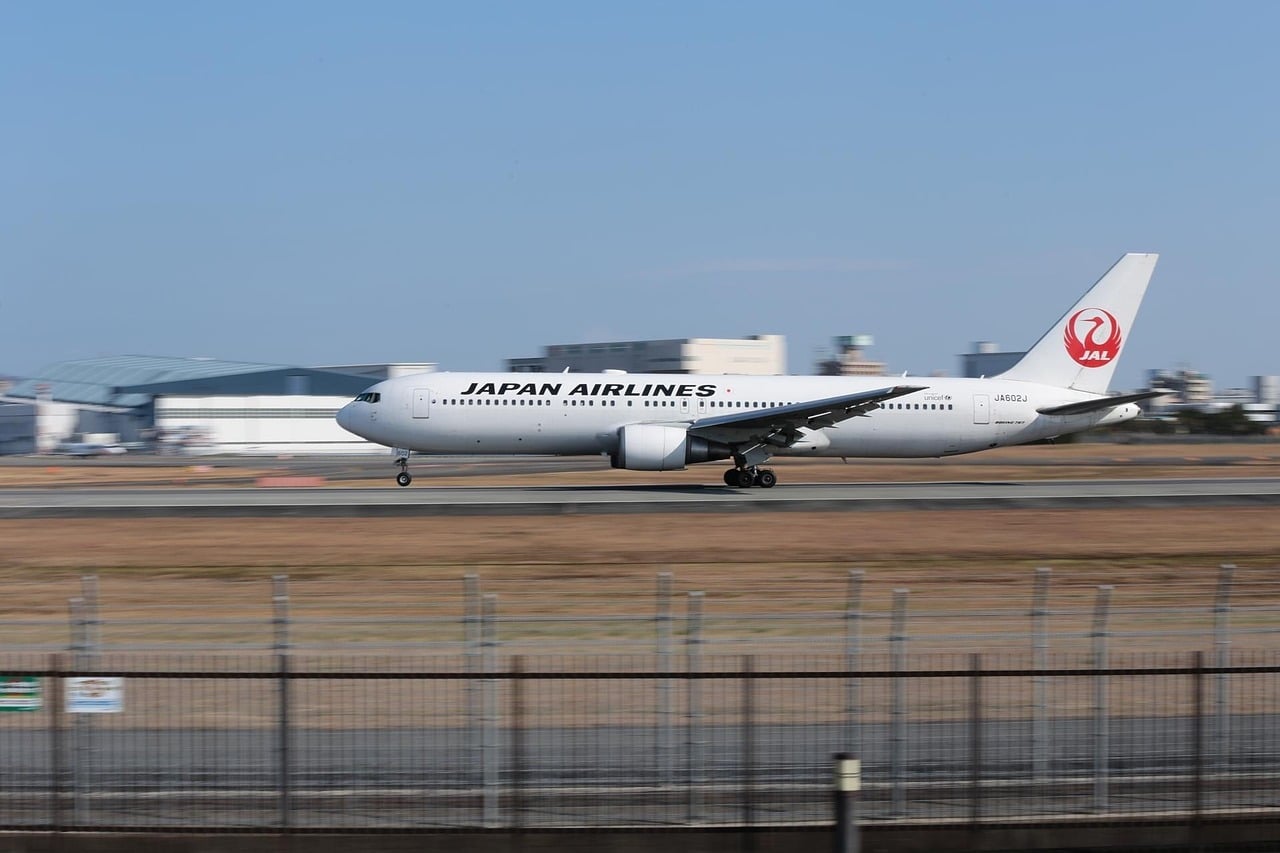
Japanese airports aren’t just places to land: they’re an entire cultural showcase on their own. For example, at the Narita Airport , you’ll see pet hotels , gacha machines , the (in)famous smart toilets and even a Pokémon Store !
22. Welcome, please come in — yokoso, o-hairi kudasai
23. please show your ticket — chiketto o misete kudasai, 24. please show your passport — pasupooto o misete kudasai, 25. what is your reservation name — yoyaku-mei wa nan desu ka, 26. the flight is delayed — furaito chien shiteimasu, 27. the flight has been canceled — furaito kyanseru saremashita, 28. baggage claim is this way — baggeji kureimu wa kochira desu, 29. we have arrived at … airport — … kuko ni tochaku shimashita, 30. we will depart for … airport — … kuko e shuppatsu shimasu, 31. there is a delay in the flight — furaito ni okure ga arimasu, 32. there are restrictions on carry-on baggage — kinai mochikomi no nimotsu niwa seigen ga arimasu.
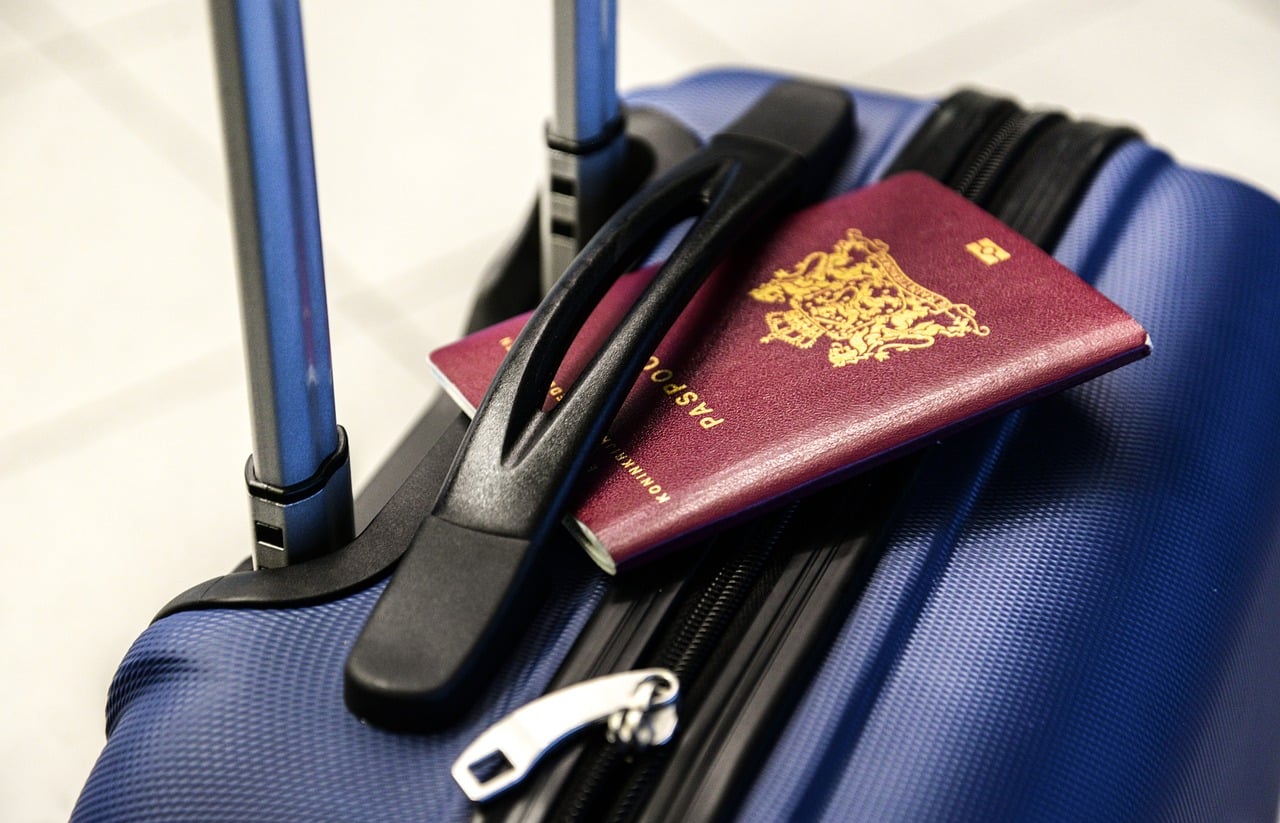
33. Please tell me how to get to the airport — kuko e no ikikata o oshiete kudasai
34. is this a departure flight — korewa shuppatsu-bin desu ka, 35. is this an arrival flight — korewa tochaku-bin desu ka, 36. where is the boarding gate — tojyo-guchi wa doko desu ka, 37. i’ll check my baggage — tenimotsu azukemasu, 38. please call a taxi — takushii o yonde kudasai, 39. i’d like to rent a car — rentakaa o karitai desu, 40. where is the gate for the connecting flight — noritsugi-bin no geeto wa doko desu ka.

Asking for directions is sort of daunting, especially when the person answers in a whole stream of fast-paced Japanese.
But you’ll find that Japan is one of the best places to be a lost and hopeless tourist. There’s always someone nearby who’s more than happy to help. I’ve even had people take time out of their days to walk me where I needed to go!
Simply say wherever it is that you want to go followed by どこですか? — doko desu ka? (Where is …?).
41. I want to go… (here) — (koko) ni ikitai desu
Say ここ if you have an address written down or a point marked on a map of where you want to go.
If you know the name or address of the place where you want to go, simply say the place name followed by に行きたいです . For example, if you want to go to Shinjuku station, you simply say 新宿駅に行きたいです — Shinjuku eki ni ikitai desu . (I want to go to Shinjuku station.)
42. Where is the…? — …wa doko desu ka?
43. can you please show me where we are on the map — watashitachi ga doko ni iru no ka, chizu de oshiete kudasai.
This might seem like an odd question (and a bit of a mouthful), but it can be a lot more helpful than asking for directions from someone who doesn’t know English.
44. Is it near? — chikai desu ka?
45. is it far — tooi desu ka.

46. Go straight ahead — massugu itte kudasai
47. turn left — hidari ni magatte kudasai, 48. turn right — migi ni magatte kudasai.

In Japan, public transportation is how most people get around. If you’re not used to taking the bus, train or anything similar, better keep the following phrases handy!
49. Take me to this address, please — kono jyusho made tsureteitte kudasai
50. what is the fare — ryoukin wa ikura desu ka, 51. stop here, please — koko de tomatte kudasai, 52. does this bus go to (street name) — kono basu wa … ni ikimasu ka, 53. does that train stop at … — sono denshya wa … de tomarimasu ka, 54. a map, please — chizu o onegai shimasu, 55. this hotel — k ono hoteru, 56. the subway — chikatetsu , 57. the train station — denshya no eki, 58. the bus stop — basutei, 59. the taxi stand — takushii noriba, 60. the exit — deguchi, 61. the entrance — iriguchi, 62. the bathroom — toire.

Like other service-oriented businesses in the country, Japanese hotels subscribe to the concept of omotenashi , which roughly translates to pouring your whole heart into service. That means you can expect employees at Japanese hotels to go above and beyond when it comes to making you feel welcome.
63. I have a reservation under the name of … — … no yoyaku o shiteimasu
64. i would like to check-in — chekkuin shitai desu, 65. what time is check-in — chekkuin wa nanji desu ka, 66. is breakfast included — choshoku wa fukumareteimasu ka, 67. where is my room — watashi no heya wa doko desu ka, 68. please give me a wake-up call at … — … ni weikuappu kooru onegaishimasu., 69. where is the nearest convenience store — ichiban chikai konbini wa doko desu ka, 70. can you recommend a good restaurant nearby — chikaku no oishii resutoran o shokaishite moraemasu ka, 71. what time is check-out — chekkuauto no jikan wa nanji desu ka, 72. where can i store my luggage — nimotsu wa dokoni azukeraremasu ka, 73. is there wi-fi in the hotel — hoteru ni wa wai-fai ga arimasu ka, 74. where is the nearest atm — ichi-ban chikai atm wa doko desu ka, 75. i’d like to have some extra towels, please — yobun no taoru o kudasai., 76. what time is breakfast served — choshoku wa nanji kara desu ka, 77. excuse me, i need an iron and ironing board — sumimasen, airon to iron-dai ga hitsuyo desu..
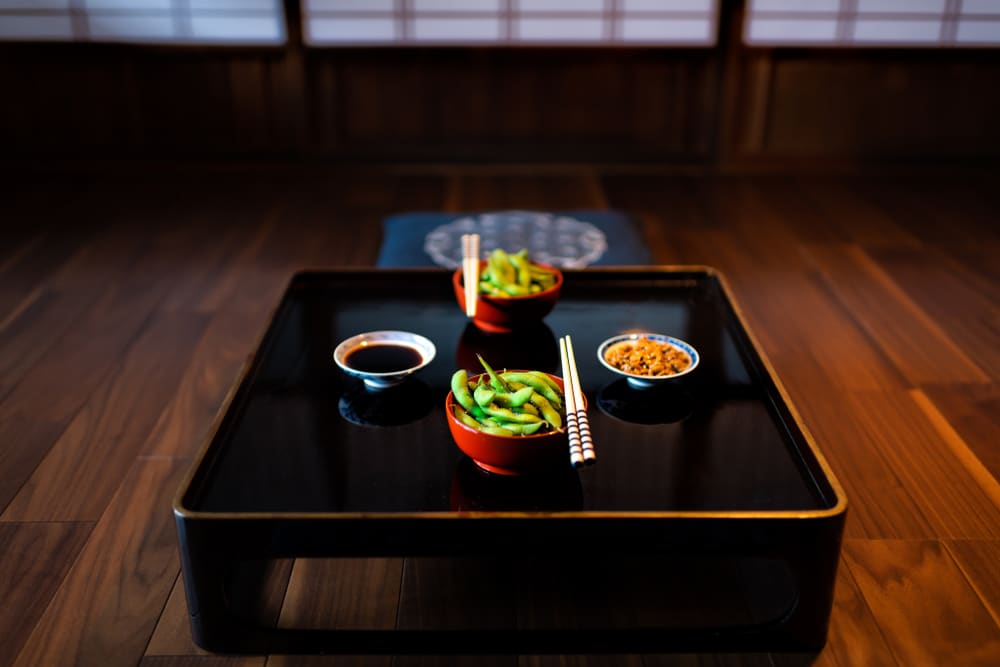
Like Japanese hotels, Japanese restaurants also practice omotenashi. Here are some of the more common phrases you’ll hear from Japanese restaurant staff.
78. Welcome — Irasshaimase
79. how many people in your party — nan mei sama desu ka, 80. this way, please — kochira e douzo, 81. certainly (in response to your order) — kashikomarimashita, 82. thank you for waiting — omatase itashimashita.

The best restaurants in Japan are the authentic ones that don’t cater to tourists. But these are also the places that have no English menus, and sometimes no English-speaking waitstaff.
Luckily, it’s very common for Japanese menus to feature photos of all the dishes. And many places have models of their dishes on display, so you likely won’t be going in completely blind.
Use these phrases , and you should be in and out of a restaurant without too many hiccups.
83. A table for two, please — futari you no teeburu o onegai shimasu
You can also replace futari with the number of people who you need to have seated:
- one — hitori ( 一人 )
- three — sannin ( 三人 )
- four — yonin ( 四人 )
If you’re confused about Japanese numbers and counters, don’t despair. You can just do as the locals do and indicate the number of diners by holding up your fingers.
84. The menu, please — menyu o onegai shimasu
85. what are today’s recommendations — kyo no osusume wa.
If everything on the menu looks appetizing and you’re not quite sure what to order, use this phrase.
86. Water, please — mizu o onegai shimasu
87. two beers, please — biiru o nihai onegai shimasu, 88. can i please have (one, two) of this — kore o (hitotsu, futatsu) onegai でdekimasu, 89. do you have a vegetarian dish — bejitarian youno ryouri ga arimasu ka.
I’ve traveled in Japan with vegetarians twice, and this question usually draws quite strange looks. Vegetarianism basically doesn’t exist in Japan, although Japanese cuisine is generally quite vegetarian-friendly.
It might work better to say これは肉ですか? — kore wa niku desu ka? , to say “is this meat?” Follow up with 私は肉を食べません — watashi wa niku o tabemasen, which means “I don’t eat meat,” if you want to make yourself understood.
90. Is … in it? — … wa haitte imasu ka?
Alternatively, you can also ask if specific ingredients are included in your food, so you’ll know whether you should order it or not.
91. That’s okay — daijyoubu desu
You can also use this expression to ask someone if they’re okay. Just add the question particle ka to the end: 大丈夫ですか ? — daijyoubu desu ka?
92. The check, please — okanjyou o onegai shimasu
Say the above, or you can do as the locals do and catch the waiter’s eye (with a smile!) and draw a clockwise circle in the air with your index finger pointing towards the roof.
In some restaurants, you need to bring the check to the cash register which is usually located by the restaurant’s doorway.
93. Cheers! — kanpai!
94. it was delicious — oishikatta desu, 95. water — mizu, 96. wine — wain, 97. beer — biiru , 98. tea — ochya, 99. coffee — coohii, 100. juice — juusu, 101. meat — niku, 102. chicken — toriniku , 103. pork — butaniku, 104. beef — gyuniku , 105. fish — sakana , 106. rice — gohan, 107. bread — pan , 108. vegetables — yasai , 109. fruit — kudamono.
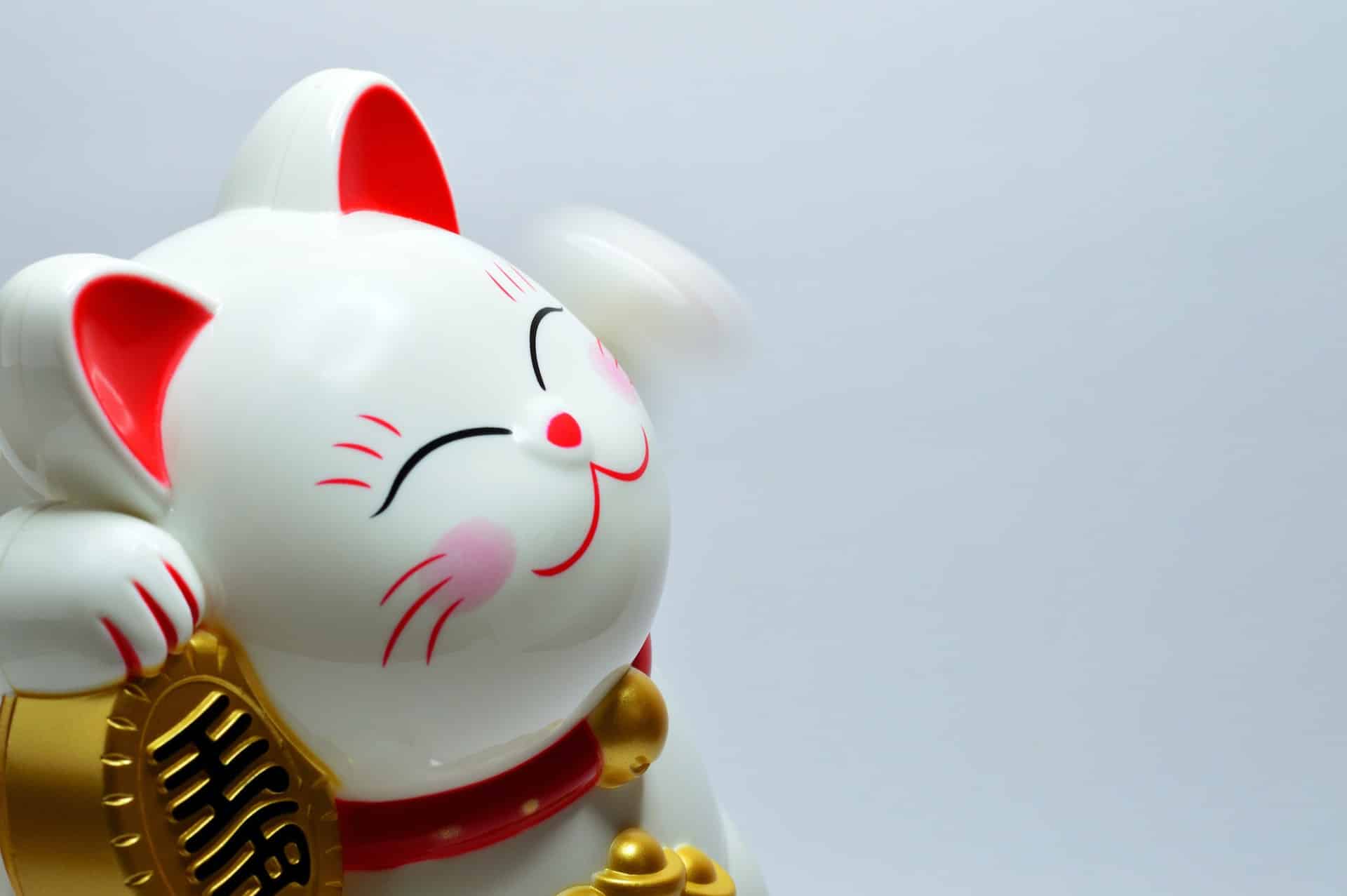
When you’re met with cries of いらっしゃいませ!, you’re not really expected to respond to this greeting. As for me, I just smile and say こんにちは which means, of course, “hello.”
Walking into a department store is particularly surreal, with each assistant taking cues from the others, so that every time a customer walks in, いらっしゃいませ bounces around the entire floor.
110. Are you looking for something? — nani ka osagashi desu ka?
111. is that all — ijyou de yoroshii desu ka, 112. here it is / here you go — hai, douzo.

113. I would like this — kore o onegai shimasu
114. i would like one of those — sore o hitotsu onegai shimasu, 115. i would like to pay in cash — genkin de onegai shimasu, 116. i would like to pay by credit card — kurejitto kaado de onegai shimasu.
The only real challenge with ordering meals in Japanese is the use of counters.
We have counters in English, too (for example “sheets” of paper, “glasses” of water, “blades” of grass), but not as many or as complicated as in Japanese.
Luckily Japanese has a “universal” counter, つ ( tsu ), which you can use for anything, including food.
The numbers one to four as つ counters are pronounced 一つ ( hitotsu )、 二つ ( futatsu )、 三つ ( mittsu ) and 四つ ( yottsu ). You can use this counter for drinks too, and the waiter will understand you.
However, if you want to be a little more impressive, you can use the drinks counter: 杯 ( hai/bai/pai depending on the number used with it). The numbers one to four using this counter are 一杯 ( ippai )、 二杯 ( nihai ) 、 三杯 ( sanbai ) and 四杯 ( yonhai ).
If you want to learn more about counters, this post explains them in more detail.
All the examples I’ve given are in the polite, neutral form of speech . You basically can’t go wrong speaking this way in Japan, so you don’t need to worry about making any social faux pas!
Some notes on pronunciation:
- Avoid turning vowels into dipthongs (vowel sounds that run into each other, like the oi in “coin”). Pronounce each vowel on its own even when there are two vowels next to each other. Onegai is read as “o-ne-ga-i,” not “o-ne-gai”
- The sound ou and repeated vowels like ii and ee are exceptions: they show an elongation of the sound. Ohayou is read as “o-ha-yoh,” not “o-ha-yo-u.”
- Treat ん (n) as its own syllable. Konnichiwa is read “ko-n-ni-chi-wa,” not “ko-ni-chi-wa.” It’s subtle, but it makes a difference!
- Repeated consonants are pronounced. For an example of how to do this, just read the word “bookkeeper” out loud.
- The small kana っ like in いって signify a break between the sounds —”it-te,” not “i-te.”
- Small y- kana like ゃ in おちゃ add the y sound to the preceding syllable —”o-chya,” not “o-chi-a.”
- は (ha) as a particle is pronounced wa, and を (wo) as a particle is pronounced o.
The beauty of Japanese is that it’s an extremely phonetic language, so if you say the words exactly as you read them, you can’t really get them wrong.
Having said that, people will probably struggle to understand you if you speak in a strong non-Japanese accent, so it might pay to listen to some spoken Japanese before you start practicing pronunciation.
The most important thing to remember is that, unlike English speakers, Japanese speakers don’t put emphasis on the second or third syllable of a word—there’s some emphasis on the first syllable, but it’s subtle.
Some ways that you can listen to Japanese being spoken is by watching Japanese films , television programs , anime or YouTube clips .
The Japanese language program FluentU has a little bit of everything in the media, with interactive subtitles and customizable flashcards for a well-rounded learning experience.
Maybe this seems like a lot, but learning Japanese travel phrases for tourists will make your trip run more smoothly, and the people you meet will appreciate your effort.
Speaking the local language tends to get people on your side. They’re less likely to try to rip you off, and often will want to become your best friend.
I like to make little phrasebooks for myself when I travel, so I can have these Japanese travel phrases and vocabulary always on hand.
I’ve been treated to tea and dinner in people’s homes, and once was driven around a city with a personal guide/impromptu friend all day, just because I struck up conversations in the local language.
Don’t be scared! Give it a try!
Enter your e-mail address to get your free PDF!
We hate SPAM and promise to keep your email address safe

Boutique Japan
20 Essential Japanese Phrases for Travelers to Japan
If you’re visiting Japan and a little worried about the language barrier (or you simply love languages), we’ve got you covered with these essential Japanese phrases for travelers.
In our guide to what we believe are the most important Japanese phrases for travel, we’ll introduce you to a selection of key words and phrases — and explain why the Japanese language barrier is not as worrisome as you might think.
The truth is, you do not need to speak any Japanese to have a successful, wonderful trip to Japan (and if you’re looking for travel inspiration, check out our favorite destinations in Japan ). However, learning a few key Japanese phrases can make your trip just that much better. So let’s get into it!
Download our Free Japanese Phrasebook:
Originally written in 2014, this post was updated and republished on November 1, 2019.
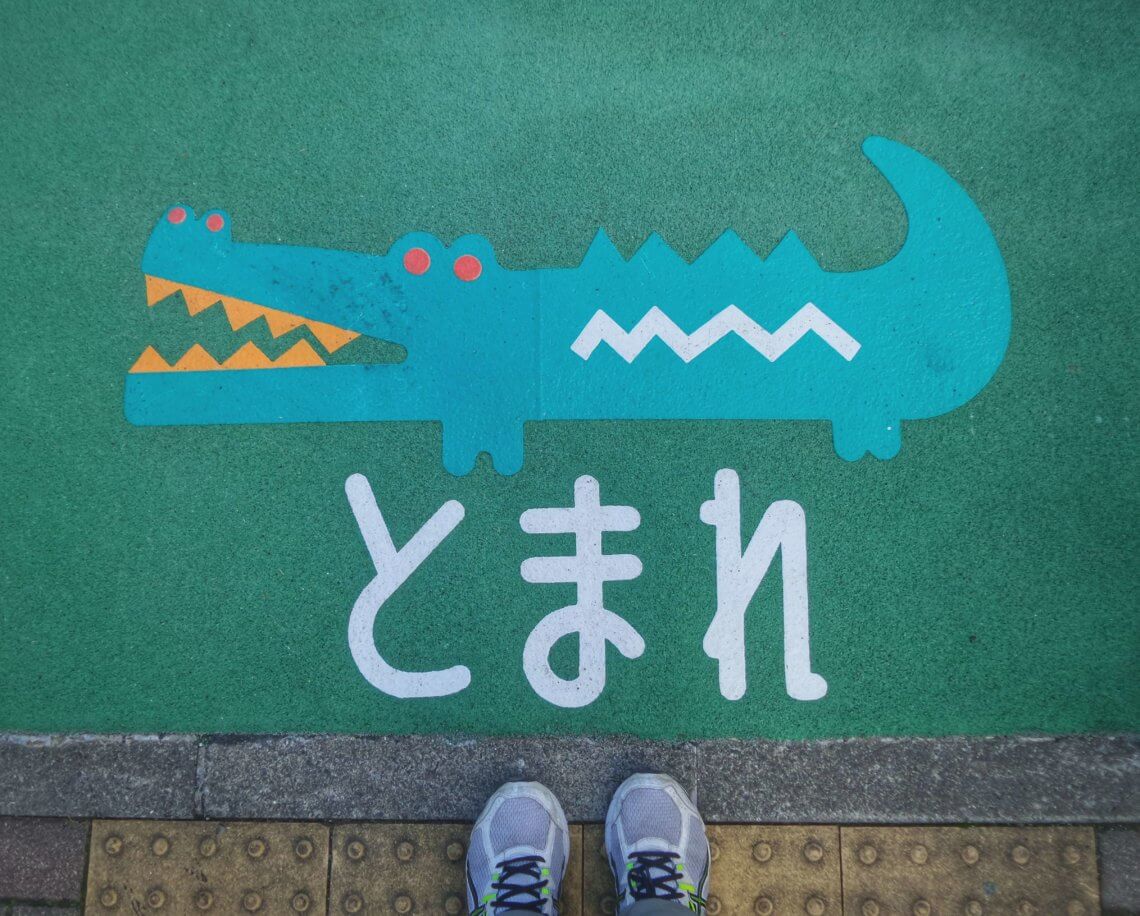
The Most Essential Japanese Words & Phrases for Your Trip to Japan
Learning Japanese can seem daunting, but don’t worry. You don’t need to learn any of these words or phrases to have a great time (see why we love Japan ).
However, as any seasoned traveler knows, making a little linguistic effort can go a long way, and it can be helpful to learn even a little of the local language for your travels. We’ve narrowed it down to a small selection of key words and phrases, divided by category:
- The Basics: Key Japanese Words and Phrases
- Food and Drink: Eating Your Way Around Japan
- Now or Later: Time-Related Phrases in Japanese
- Getting Around Japan: Transportation-Related Phrases
Here is a quick look at the words and phrase you’ll find below:
Top 20 Essential Japanese Travel Phrases:
- Konnichiwa (こんにちは) – Hello
- Arigatou Gozaimasu (ありがとうございます) – Thank you
- Sumimasen (すみません) – Excuse me
- __ o Kudasai (__をください) – I would like __, please
- __ wa Doko Desu ka? (__はどこですか) – Where is __?
- Itadakimasu (いただきます) – An expression of gratitude for the meal you’re about to eat
- Omakase de (お任せで) – Used to order chef’s recommendation (often for sushi)
- O-sake (お酒) – General term for alcohol
- Nihonshu (日本酒) – Japanese sake
- Kinen Seki (禁煙席) – Non-smoking seat
- Ima Nanji Desu ka? (今何時ですか) – What time is it now?
- Nanji ni? (何時に?) – At what time?
- Asa (朝) – Morning
- Kyou (今日) – Today
- Ashita (明日) – Tomorrow
- __ ni Ikitai (__に行きたい) – I want to go to __
- Tomete Kudasai (止めてください) – Stop, please
- Kippu (切符) – Ticket
- Shinkansen (新幹線) – Bullet train
- Dono Densha? (どの電車?) – Which train?
If you’re concerned about memorizing all this Japanese, or want to learn even more words and phrases, download Boutique Japan’s Tiny Phrasebook for free.
And for an introduction to how to say these words and phrases, see our bonus video to help you practice your Japanese pronunciation .
Basic Japanese Words and Phrases
Let’s start with a few of the most basic-yet-essential Japanese words and phrases. Even if you only remember how to say hello or thank you , you’ll find that Japanese people will be appreciative of your efforts!
1. Konnichiwa (こんにちは) – Hello
Let’s start with one you’ve probably heard before: the word for hello is konnichiwa .
Konnichiwa is typically used during the day, and there are other phrases for good morning and good evening ( ohayou gozaimasu , and konbanwa , respectively). But when you’re starting out it’s best to keep things simple, and if you simply learn konnichiwa you can use it throughout the day to say hello !
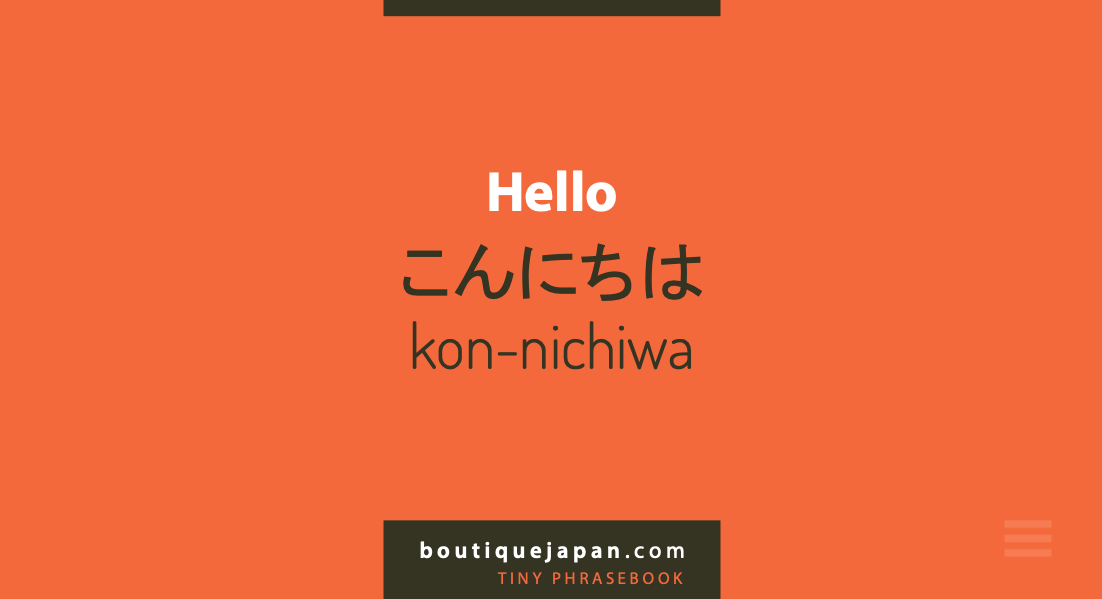
2. Arigatou Gozaimasu (ありがとうございます) – Thank you
In Japan, etiquette is no joke, and chances are you’ll be saying thank you a lot (learn more in our guide to Japanese etiquette ).
The word for thank you in Japanese is arigatou gozaimasu (in Japanese, the u at the end of some words is barely pronounced to the point of being nearly silent). You can usually simply say arigatou , which is a little more casual but usually perfectly fine. In Japan, where politeness is such a key part of the culture, you’ll be saying arigatou gozaimasu a lot!
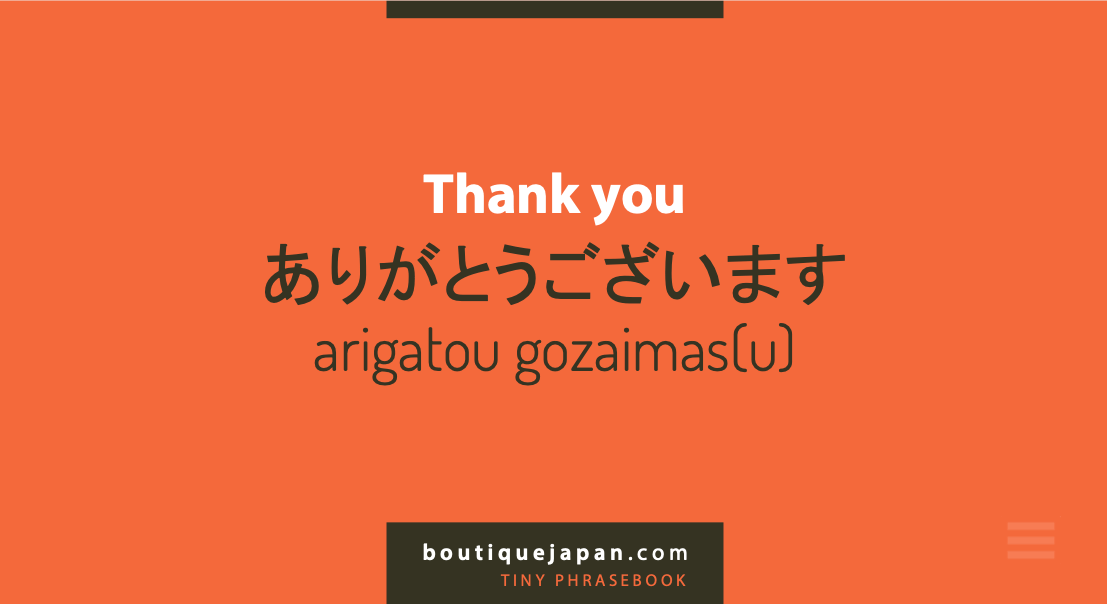
3. Sumimasen (すみません) – Excuse me
Excuse me is an important expression in any language, and Japanese is no exception.
The word for excuse me in Japanese is sumimasen . Chances are you’ll also be using this one quite a bit, so if you can try and memorize it! It’s a doubly useful word, as it can be used both to get a person’s attention, and also to apologize.
For example, use sumimasen at an izakaya (a Japanese-style gastropub) to get a waiter’s attention. At izakaya , it’s often called out as sumimaseeeeee~n ! On the other hand, if you accidentally walk onto a tatami floor with your shoes on (something you’re likely to do at some point) you can use sumimasen to say I’m sorry .
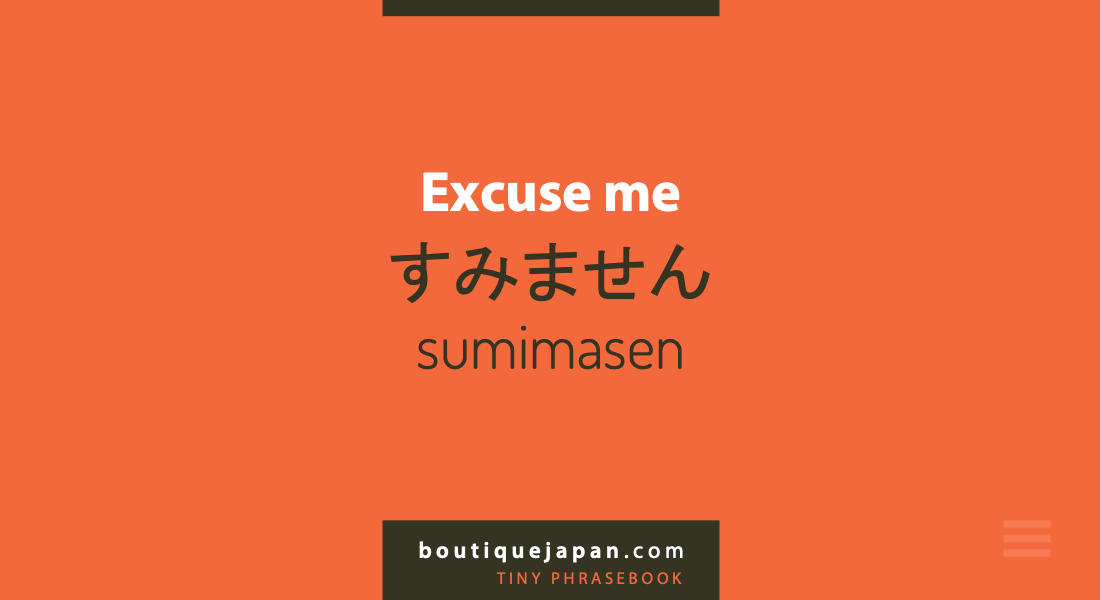
4. __ o Kudasai ( をください) – I would like , please
Now that we’ve covered three basic essentials, we can move onto two key sentences that will hopefully help you a lot.
First is I would like __, please . This is useful in a variety of situations: at restaurants, in stores, and on many other occasions you’ll encounter while traveling. In Japanese, it’s __ o kudasai (simply fill in the __ [blank] with the item of your choice).
To get the most out of this phrase, you may want to learn a few vocabulary words, such as water (mizu), beer (biiru) , sake , and others you think you may need.
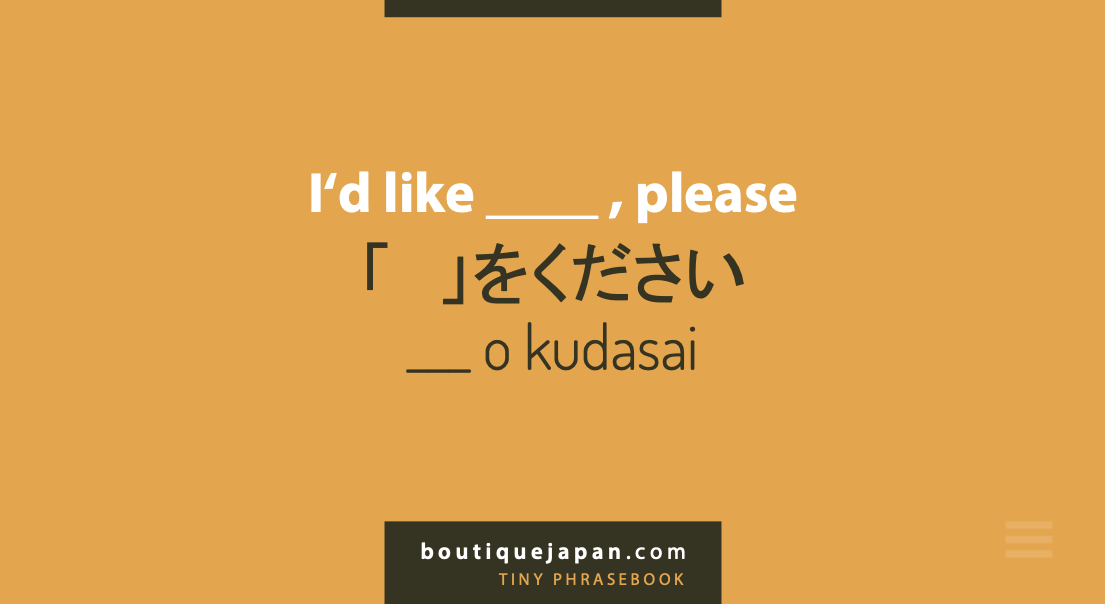
5. __ wa Doko Desu ka? ( はどこですか) – Where is __?
Last but not least, we think it’s quite useful to be able to ask Where is the __? This is useful even if you can’t understand the answer, because once you ask, people will be able to point you in the right direction, or even help you get to where you’re going!
In Japanese, it’s __ wa doko desu ka? (simply fill in the __ [blank] with the place you’re trying to reach, such as the Ghibli Museum ). One key vocabulary word that often goes along with this phrase for travelers is eki , which means station (for example, Shinjuku eki is Shinjuku station ).
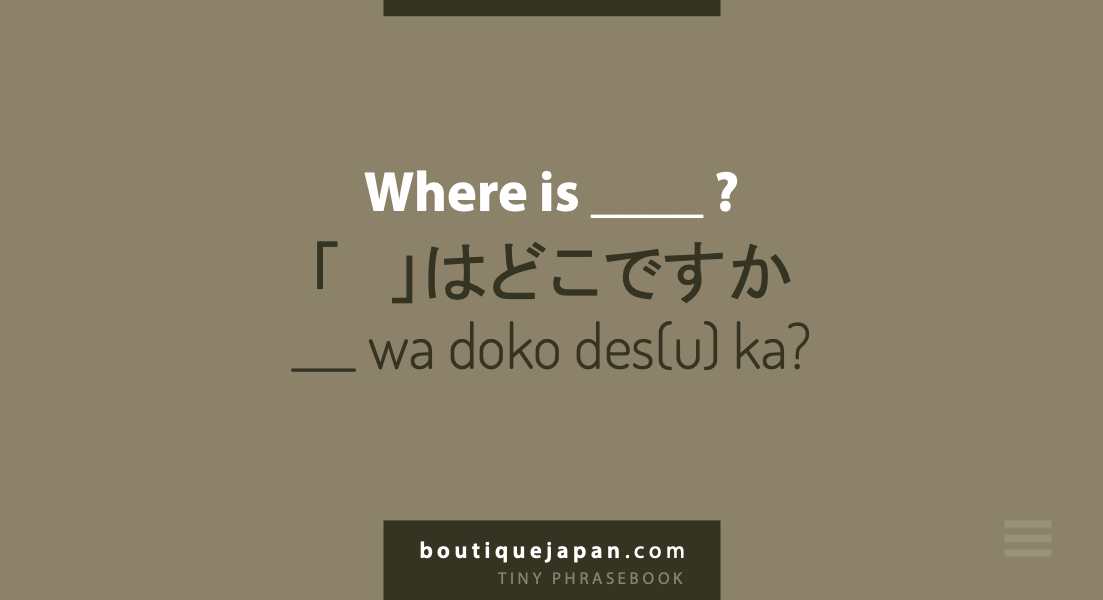
Eating Your Way Around Japan: Food and Drink Phrases
For many travelers, Japanese food is a top priority! From classic Tokyo sushi restaurants to the legendary food culture of Okinawa , there’s a lot to take in. For alcohol afficionados, Japan also offers sake , Japanese whisky , shochu , and other traditional beverages.
While you don’t need to speak any Japanese to enjoy eating and drinking in Japan, these key words and phrases will help you make the most of your culinary experiences.
6. Itadakimasu (いただきます) – An expression of gratitude for the meal you’re about to eat
Certainly not required, but if you say itadakimasu before you begin eating, whether in a restaurant or at a person’s home, they will surely be impressed with your manners.
Essentially, this phrase expresses humility and thanks for the meal you are about to enjoy. The website Tofugu does a very nice job of explaining the meaning of itadakimasu .

7. Omakase de (お任せで) – Used to order chef’s recommendation (often for sushi)
If you’re a passionate sushi enthusiast, you probably already know the meaning of omakase .
When you tell a chef omakase de , you’re letting them know that you’re placing the meal in their hands. Especially for travelers with adventurous palates, this is the best way to experience a meal at a Tokyo sushi shop , for example.
However, the phrase is not only used at sushi restaurants, and can often be used at other types of establishments as well.

8. O-sake (お酒) – General term for alcohol
Technically osake , this word has tripped many a non-Japanese speaker up! While in English the word sake means, well, sake , in Japanese the word sake — more politely, osake — refers to alcoholic beverages in general.
( Sake and osake are virtually interchangeable; the “o” is what is known as an honorific prefix, but unless you’re studying Japanese in more depth, you really don’t need to worry about this!)
So if you’re looking for sake (which in Japanese is called nihonshu) , it’s best to ask for nihonshu (see below). If you’re simply looking for an adult beverage (such as nihonshu , shochu , or Japanese whisky ), the catchall term sake will do the trick.

9. Nihonshu (日本酒) – Japanese sake
See above for the distinction between sake and nihonshu !
10. Kinen Seki (禁煙席) – Non-smoking seat
Encountering cigarette smoke is somewhat of an unavoidable aspect of traveling around Japan. This being said, most of our travelers are quite averse to smoke, and fortunately it’s possible to travel around Japan without smoke becoming too much of a nuisance.
In some places, such as restaurants, you may have a choice between the smoking and non-smoking sections. Kinen means non-smoking, and seki means seat : put them together and you’ve just conveyed that you’d like to be seated in the non-smoking area!

Time-Related Phrases in Japanese
Time-related phrases can be extremely helpful in certain travel situations, and below you’ll find a few of the most practical Japanese words and phrases on this topic.
11. Ima Nanji Desu ka? (今何時ですか) – What time is it now?
Chances are you’ll have a watch or cell phone on you, but once in a while you may need to ask a stranger for the time.
The basic phrase is simply nanji desu ka? which means, What time is it? People also commonly say ima nanji desu ka? which simply means, What time is it now? ( Ima means now.)

12. Nanji ni? (何時に?) – At what time?
This is a particularly useful phrase while traveling. It can be helpful when purchasing rail tickets (see more on getting around Japan below), making meal reservations, or arranging tickets to events.
Sure, you could just ask nanji? ( what time? ) and hope your point gets across, but by adding the preposition ni you can be assured of much more clarity!
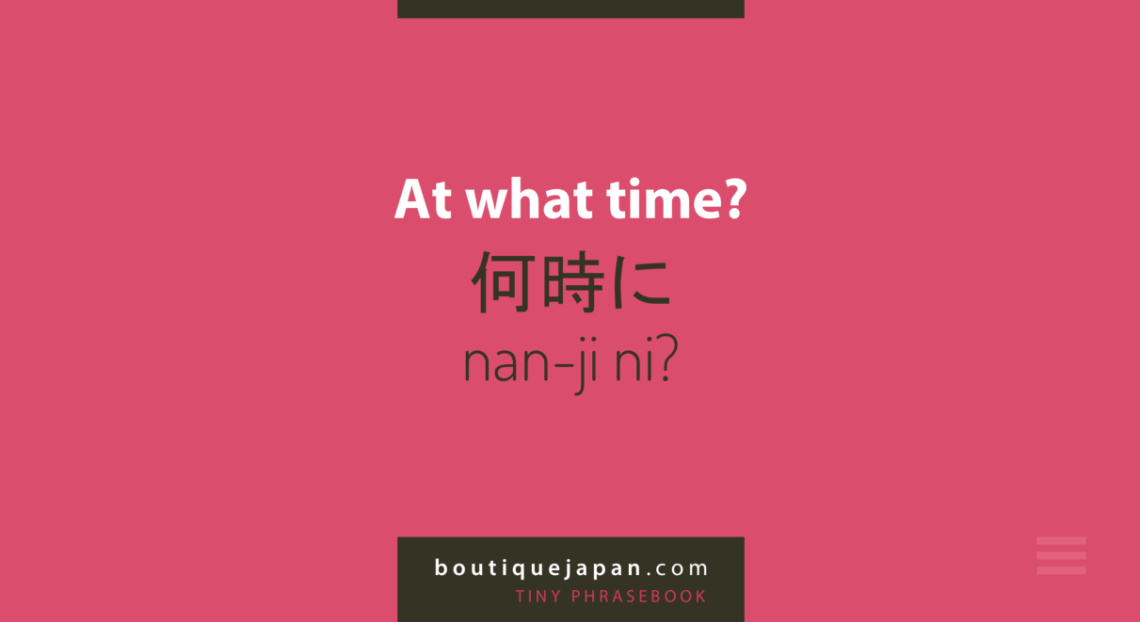
13. Asa (朝) – Morning
This one is fairly self-explanatory: asa means morning . While it’s no surprise that a food-loving culture like Japan has multiple words for breakfast , one of the most common is asagohan ( gohan literally means rice , but is more generally used to mean food ).

14. Kyou (今日) – Today
Words like today and tomorrow can be particularly useful when buying train tickets, for example. For more on transport, see the transport-related phrases below.

15. Ashita (明日) – Tomorrow
When pronouncing the word for tomorrow, ashita , the i is virtually silent, so it ends up sounding more like ashta . If you need to express the day after tomorrow, the word is asatte .

Getting Around Japan: Transportation-Related Phrases for Travelers to Japan
For some travelers, one of the biggest concerns about not speaking the language is the prospect of getting around the country, navigating the trains, and trying to avoid getting lost.
Fortunately, Japan has an incredibly efficient and easy-to-use rail network, and you can read all about it in our guide to train travel and getting around Japan . And here are some key Japanese words and phrases to help you on your way.
16. __ ni Ikitai ( に行きたい) – I want to go to __
On its own, ikitai means, I want to go .
To express that you’d like to go somewhere, use the phrase __ ni ikitai (simply fill in the __ [blank] with the place you’re trying to reach). For example, Kyoto ni ikitai means, I want to go to Kyoto .

17. Tomete Kudasai (止めてください) – Stop, please
Tomete means stop , and is particularly useful in taxis. The kudasai here means please , and makes the phrase much more polite ( tomete on its own would come off as quite brusque).

18. Kippu (切符) – Ticket
Kippu means ticket (as in train tickets). As you can easily imagine, when purchasing rail tickets it can be very useful to be able to tell the ticket agent that you’d like a ticket to a certain place!
Made means until or to (in this case, to your destination). For example, Osaka made means to Osaka . Thus, Osaka made no kippu means ticket to Osaka . Put it all together with kudasai (for politeness) and you have Osaka made no kippu o kudasai .

19. Shinkansen (新幹線) – Bullet train
Ah, the shinkansen . One of the utter joys of traveling around Japan is the world-famous shinkansen (bullet train).
Whether you have the well-known Japan Rail Pass or not, if you’re doing any domestic travel within Japan, chances are you’ll end up on the incredible (and incredibly pleasant) shinkansen for at least one if not more of your journeys. Enjoy, and grab a bento and some nihonshu (see above) for the ride!

20. Dono Densha? (どの電車?) – Which train?
Wondering which train you need? Imagine you’re in Kyoto Station, headed for Tokyo. You’re on your shinkansen’s departure platform, but you see two trains.
You show your ticket to a friendly Japanese person, and ask, dono densha? They take a look at your ticket and the two trains, and point you to the right one. And you’re on your way – happy travels!

Download our Free Japanese Phrasebook PDF
For those of you who want to learn even more Japanese for travel, we’ve created the Boutique Japan Tiny Phrasebook.
Our Tiny Phrasebook features carefully selected Japanese words and phrases designed to help you get the most out of your trip to Japan. You’ll find all of the words and phrases featured above, and many more!
The phrasebook is a beautifully designed PDF (it may take a few moments to load depending on your internet speed).
Simply save it to your smartphone, tablet, or computer. We suggest using an app like iBooks (or another PDF reader) so you can search for words and navigate easily.
Bonus Video: Practice your Japanese Pronunciation
One of the best things about Japanese is that it’s surprisingly easy to pronounce. Unlike several other languages throughout Asia, Japanese is not a tonal language.
In the video below, we go over basic pronunciation for some of the most useful Japanese words and phrases for your trip to Japan.
Do you need to speak any Japanese to travel around Japan ?
Absolutely not. You can travel to Japan without learning any of these words and have a great time.
People ask us about the Japanese language barrier all the time, with common questions such as, Do Japanese people speak English? How much (or how little)? The language barrier is a common myth that shouldn’t get in your way. Most of our travelers don’t speak a single word of Japanese, yet come back with testimonials of how much they love Japan .
The truth is that most Japanese people speak at least a little bit of English. These days, all Japanese students study English for a minimum of six years in secondary school, and many students — as well as adults — also take English-language classes after school or on weekends.
English-language fluency is not widespread, so most people you meet probably won’t be fluent in English, but almost everyone you meet will know at least a few English words – and many will know anywhere from hundreds to thousands.
Sometimes you may find that the people you meet are hesitant to try their English on you, but you’ll likely find that you can communicate in basic English in a huge variety of situations while traveling around Japan.
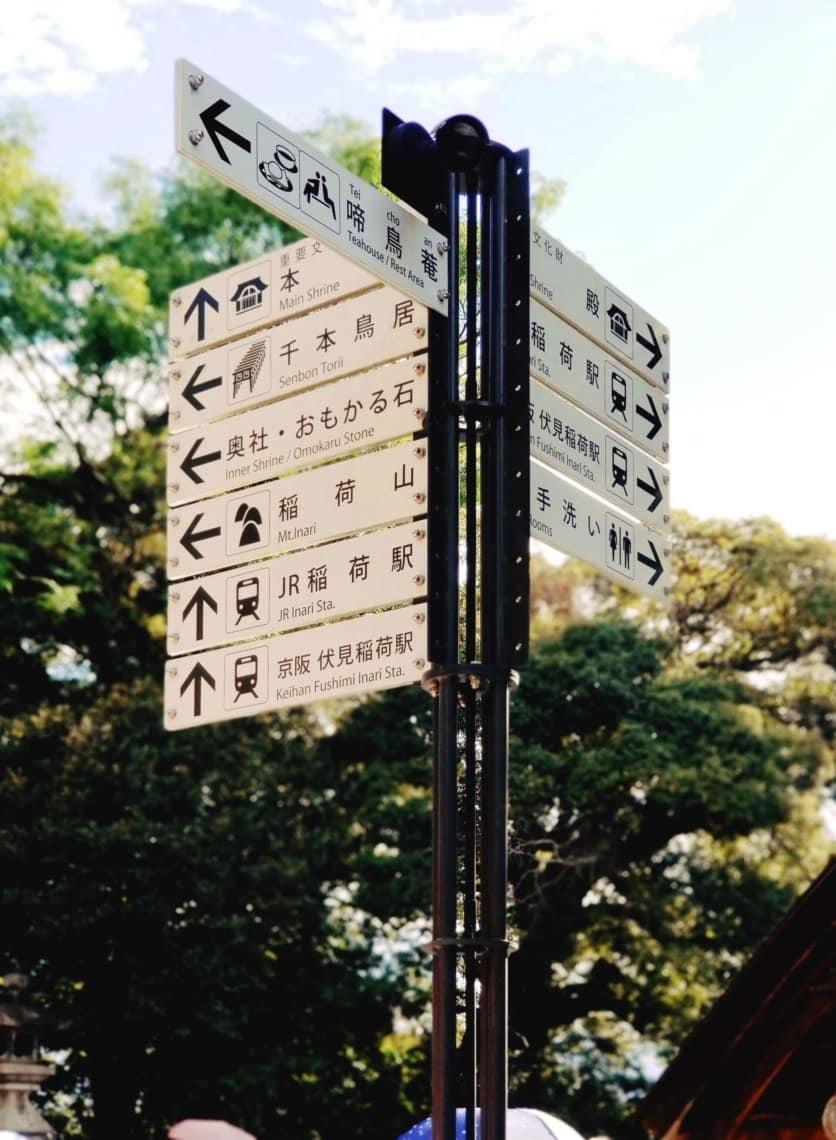
The Japanese Written Language
You may also be worried about the written language. The good news is that you don’t need to be able to read or write Japanese to enjoy Japan.
Japanese people don’t expect you to be able to read the Japanese language, and you’ll find English-language signage throughout the country. This is especially true in places frequented by travelers, such as sightseeing spots, shopping areas, train stations, airports, and often even on the street.
As for at restaurants, though it’s not always the case, in some cases you will find English-language menus. When English-language menus are not available, photos are often included to make pointing and ordering possible.
Despite Japan’s travel-friendliness, every visitor to Japan at some point finds him or herself in a situation in which linguistic communication is simply not possible, and sign language and gesturing are required.
Getting lost in a foreign country where you don’t speak the language is a fear of many would-be travelers, but if you had to pick a country in which to get lost, you couldn’t do much better than Japan! Japan is by far one of the safest countries in the world, with crime rates that are astonishingly low compared to places like the US and most of Europe. And Japanese people will often go to surprising lengths to help tourists.
Back when I first moved to Japan I spoke very little Japanese, and on my first visit to Kyoto I accidentally took the wrong train and ended up wandering around a neighborhood with no idea how to get where I wanted to go. Luckily, an older gentleman with his wife spotted me looking confused and came up to me with perhaps one of the only English phrases he knew: “ Are you lost? ” I said yes and showed him the name of the place I wanted to go.
If he had simply pointed me in the right direction it would have been helpful, but instead he started walking me in the right direction. After a few minutes of walking his wife split off, presumably to go home, and we continued. After 15 minutes of walking he had dropped me off at exactly the spot I needed to be, and – as is typical in Japanese culture – expected nothing in return. I thanked him profusely and we had a good laugh despite our inability to communicate linguistically.
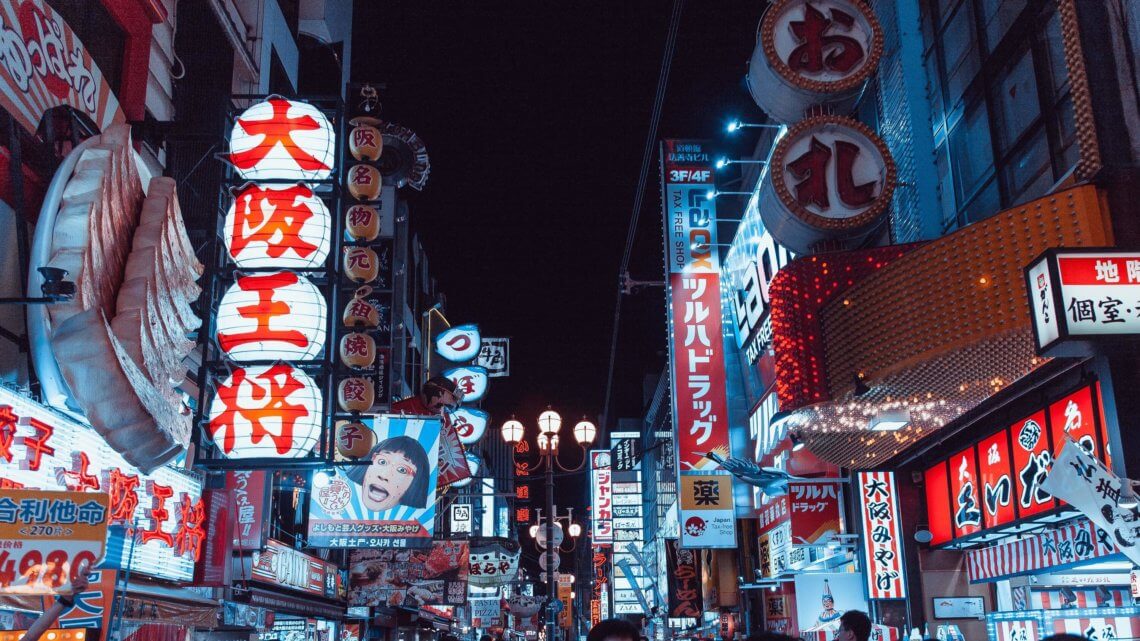
Why Learn Any Japanese if You Won’t Need it?
Almost everyone who has visited Japan has a similar story of a random act of kindness and generosity from a Japanese stranger (or a tale of a camera or passport left on a train being miraculously returned). So you can rest assured that even if you forget all of the words and phrases we’ve shown, you’ll be in good hands with the wonderful people of Japan.
But aside from the fact that it’s a rich and fascinating language, learning even just one or two Japanese words or phrases will help endear you to the Japanese people you meet during your trip, and enhance your overall travel experience.
Japanese people tend to be extremely appreciative of visitors who take the time to learn even just a word or phrase or two, and if you try then chances are you’ll be greeted with oohs and aahs of encouragement.
We hope you’ve found our guide to Japanese words and phrases for travelers helpful. Arigatou gozaimasu!
More Great Posts

Japan’s Best Boutique and Luxury Hotels & Ryokans
The best hotels and ryokans in Japan range from charming traditional inns in the countryside, to stylish design hotels and…

Traveler’s Guide to the JR Pass (Is It Worth It?)
The Japan Rail Pass (or JR Pass, for short) can be a good way to get around Japan, but many…
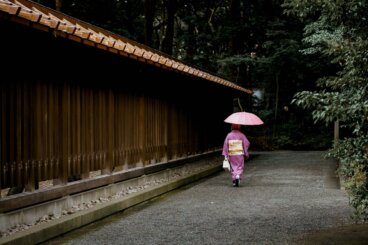
Major Holidays and Peak Travel Seasons in Japan
If you’re considering a trip to Japan during one of the country’s peak travel seasons, be aware that things can…
Plan Your Japan Trip
Learn more and contact us to discuss your unique trip.
Get Started
- The Process
- Testimonials
Join the journey: Click here to get our top tips for affordable travel!

Japanese Phrases for Travelers (A Cheat Sheet)
When traveling through Japan, it is VERY helpful to have some Japanese phrases under your belt. On my visit there, I found that many people I encountered did not speak English, so I’m so glad that I took some time to a (little) bit of Japanese before my visit.
Keep reading for a list of the top Japanese phrases for travelers, as well as some general information on the language and tips on how to start learning on your own! Your trip to Kyoto , Tokyo , and beyond will be better because of it.
Table of Contents
The Top Resources for Learning Japanese
- iTalki : Practice with Live Teachers at a low cost
- LingoPie : Learn the language by watching videos in Japanese
- Writing Practice Book : Learn how to write in Japanese script
START LEARNING TODAY!
Japanese Language Overview
Language history.
The exact origins of Japanese are disputed by top linguists, as there is evidence that it could have originated from either the Polynesian, Chinese, or the Ural-Altaic languages. For a time, many scholars agreed that Japanese is part of the Ural-Altaic language family, which also includes Turkish, Korean, Manchu, and Mongolian. Japanese has been compared with Korean due to similarities in structure, use, and grammar, but the relation is still debated. Today, it the only major language whose origin is still unknown.
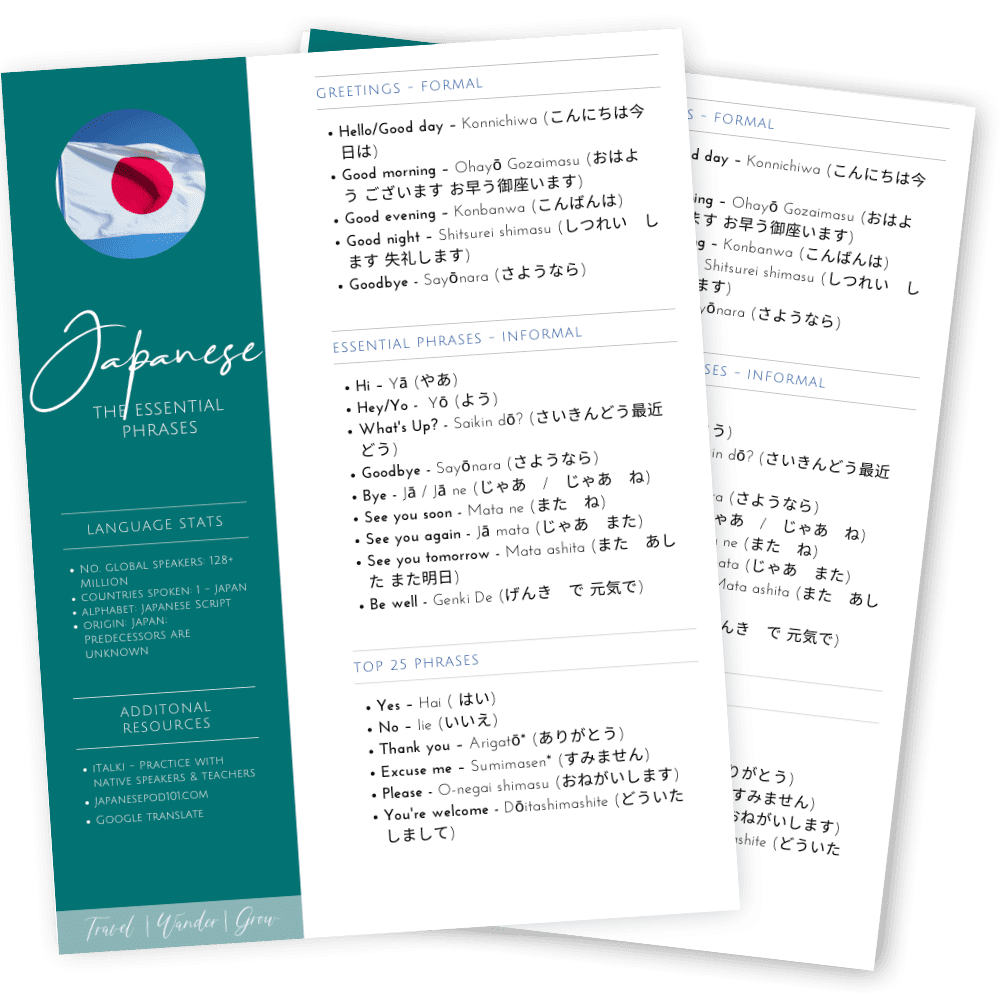
Get your free download!
Japanese phrases pdf.
This free download includes all the key Japanese phrases that you will need for your travels to Japan. In addition, get details on the best resources to improve your speaking and listening skills as well.
Japanese language history can be split into five main periods:
- Old Japanese (Prior to 8th Century)
- Late Old Japanese (9th – 11th Century)
- Middle Japanese (12th – 16th Century)
- Early Modern Japanese (17th-18th Century)
- Modern Japanese (19th Century – now)
Japanese has been a recognized language for the past 1200 years, from around the 8th century AD, where the earliest Japanese writings have been found. Some earlier evidence of the Japanese language has appeared in Chinese writings from as early as the 3rd century AD, but it is not known how long the language has existed on the island.
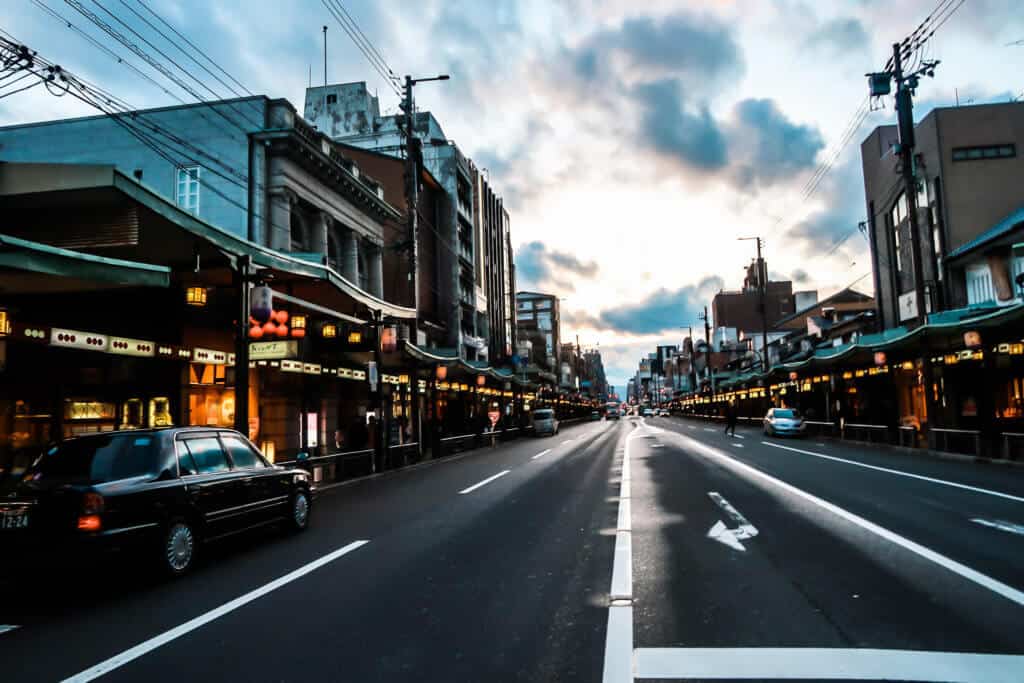
The Language Today
Today, Japanese is spoken by over 125 million people, most of whom reside in Japan. It is not the official language of Japan, but is the de facto national language of Japan. The standard form of the language is called hyojungo “standard Japanese or kyostugo “common language”. This is the variety of the language that is taught in schools and used in TV and official communications.
There are dozens of dialects spoken throughout Japan, as with many old languages. Some differences are more minor (e.g., changes to pronunciation or words used), while other dialects are so distinct from each other that they are mutually unintelligible. This is most often the case for dialects coming from peripheral regions, mountain villages, or isolated islands in the country.
I will also note, there are other languages spoken in Okinawa, as well as the Ryukyu and Amami Islands, known as the Ryukyuan languages. These languages are part of the Japonic language family, and some are considered endangered languages by UNESCO. Their decline is use is due to a shift in greater use of Standard Japanese and other dialects.
RELATED: Kyoto Travel Guide
Japanese Script
An interesting fact about Japanese that did not know until recently, is that Japanese has no genetic relationship to Chinese. Which was surprising to me because the language does use mostly Chinese characters in its written script. There have been two methods of using Chinese script – the first by using them as characters to represent an object or idea. The second method involves using the script to pronounce Japanese words phonetically – which is not widely done today.
Over time, the Japanese script has been modified from the traditional Chinese characters with the overall simplification of some characters. Additionally, there has been the incorporation of hiragana characters, which are also simplified and have a more rounded appearance.
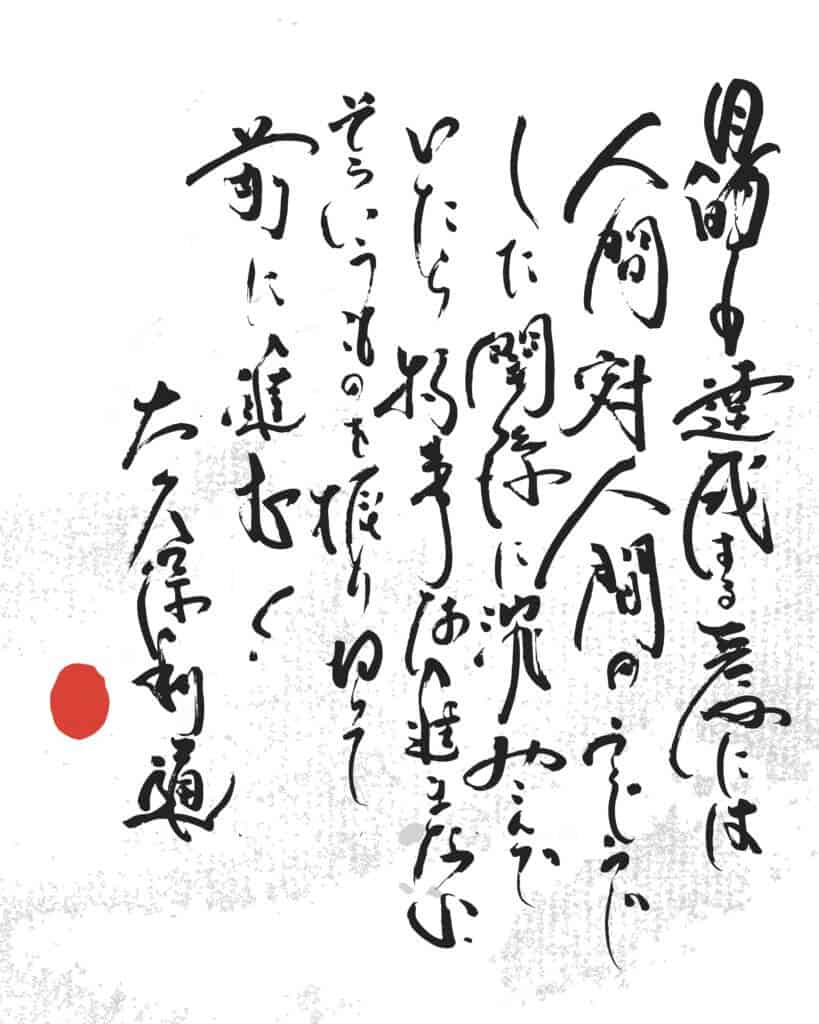
Additional Observations on Japanese
For the true language nerds out here are a few interesting facts about Japanese:
- There are no diphthongs in Japanese, only monophthongs, demonstrating that all Japanese vowels are “pure”
- Word order is classified as subject-object-verb, but the only strict rule there is that the verb must be at the end of the sentence
- The culture in Japan is VERY polite, and that is also represented in the spoken language as there is an extensive grammatical structure to express politeness, formality, and even differing levels of social status
Basic Japanese Words and Pronunciation
Japanese greetings – formal.
Here are some basic formal greetings (hi / goodbye) that you’d use on a regular day.
- Hello/Good day – Konnichiwa (こんにちは今日は)
- Good morning – Ohayō Gozaimasu (おはよう ございます お早う御座います)
- Good evening – Konbanwa (こんばんは)
- Good night – Shitsurei shimasu (しつれい します 失礼します)
- Goodbye – Sayōnara (さようなら)
Note, when greeting others in Japan be sure to accompany your words with a slight bow. This bow is often done again when saying goodbye as well.
Japanese Greetings – Informal
If you stay in Japan for a time and make friends, it may be appropriate for you to incorporate informal greetings into your vocabulary:
- Hi – Yā (やあ)
- Hey/Yo – Yō (よう)
- What’s Up? – Saikin dō? (さいきんどう最近どう)
- Bye – Jā / Jā ne (じゃあ / じゃあ ね)
- See you soon – Mata ne (また ね)
- See you again – Jā mata (じゃあ また)
- See you tomorrow – Mata ashita (また あした また明日)
- Be well – Genki De (げんき で 元気で)

Top 30 Japanese Phrases
Outside of Japanese greetings, here are the top 30 phrases that you should learn before visiting Japan:
- Hello – Kon’nichiwa (こんにちは)
- Yes – Hai ( はい)
- No – Iie (いいえ)
- Thank you – Arigatō* (ありがとう)
- Excuse me – Sumimasen* (すみません) – This phrase is important when trying to get the attention of your waiter in restaurants, and when passing people in tight quarters.
- Please – O-negai shimasu (おねがいします)
- You’re welcome – Dōitashimashite (どういたしまして)
- I’m sorry – Gomennasai (ごめんなさい)
- Do you speak English? – Eigo o hanasemasu ka (えいごをはなせますか。)
- I only speak a little Japanese – Watashi wa nihongo ga sukoshi shika hanasemasen. (わたしは にほんごがすこししか はなせません。)
- What is your name? – O-namae wa nan desu ka. (おなまえはなんですか。)
- My name is __ – Watashi no namae wa ___ desu. (わたしのなまえは かおりです)
- How are you? – O-genki desu ka. (おげんきですか。)
- I’m fine, thanks – Genki desu. (げんきです)
- I’m very glad to meet you – Oaidekite ureshī desu. (おあいできて うれしいです。)
- I don’t understand – Wakarimasen (わかりません。)
- What did you say? – Nante iimashita ka. (なんていいましたか。)
- Can you speak more slowly? – Motto yukkuri hanashite kudasai. (もっと ゆっくりはなしてください。)
- I understand you perfectly. – Yoku wakarimasu. (よくわかります。)
- How much is it? – Ikura desu ka? (いくらですか?)
- Do you have ___? – ______ wa arimasu ka? (はありますか)
- Help! – Tasukete (助けて。)
- I don’t need it. – Iranai (いらない)
- Great! / I’m glad! – Yokatta (良かった)
- Are you okay? – Daijoubu desu ka. (大丈夫ですか)
- What happened? – Doushitanda. (どうしたんだ)
- Welcome – Irasshaimase. ( いらっしゃいませ)
- How much does it cost? – Ikura kakarimasu ka? (いくらかかりますか?)
- It costs. .. – Hiyō ga kakarimasu (費用がかかります)
Note: I’ve put an asterisk by the phrases that I used the most while traveling through Japan.
Counting to 10 in Japanese
There are two methods of counting in Japanese: 1) Sino-Japanese and 2) Native Japanese. Sino-Japanese is used most often (by far), so this is what is demonstrated in the tabel below:
RELATED: The Link Between Languages and Travel
Pronouncing Japanese the Right Way
Check out this video from a native speaker that covers pronunciation for many of the phrases listed above. For best results, practice saying the words out loud so that you get used to speaking them.
Japanese Travel Phrases PDF
Keep your learning going by downloading this Japanese Phrases PDF. You will be able to practice as needed before your trip!
FAQs about Learning Japanese for Travel
Before your trip to Japan, some common phrases you should learn are “Arigatou gozaimasu” (Thank you very much), “Sumimasen” (Excuse me/I’m sorry), “Konnichiwa” (Hello), “O-genki desu ka?” (How are you?), and “Eigo o hanashimasu ka?” (Do you speak English?).
Japanese people often say “Ittekimasu” (I’ll go and come back) before leaving their home, which is a polite way of saying they are heading out. Similarly, upon returning, they say “Tadaima” (I’m back) to announce their arrival.
The Japanese word for travel is “tabi” (旅).
Some must-know phrases for Japanese travel include “Doko desu ka?” (Where is it?), “Ikura desu ka?” (How much does it cost?), “Eki wa doko desu ka?” (Where is the train station?), “Kudasai” (Please/give me), and “Osusume no o-sake wa arimasu ka?” (Do you have any recommended sake?).
Some cool Japanese phrases include “Yoroshiku onegaishimasu” (Please take care of it/Thank you in advance), “Kawaii” (Cute), “Oishii” (Delicious), “Ganbatte” (Good luck/Do your best), and “Natsukashii” (Nostalgic).
Learning Japanese for Travel | Final Recommendations
That wraps my list of essential Japanese phrases for travelers. Now that you know WHAT you need to learn, the next step is to take it into practice. I suggest that you do that by downloading the attached PDF of key Japanese phrases, and practice the phrases daily for at least a month before your trip.
To complement learning these phrases, there are a few additional resources that you may find helpful:
- iTalki – On this site you can practice with a tutor, formal teacher, or others just seeking to do a language exchange (for free!). The paid lessons have very cheap options, with some as low as $5 an hour. Check it out!
- LigoPie – Practice listening and reading Japanese with videos. You can make changes to the speed you are listening to as well. This is the best way to rapidly increase your comprehension skills!
- Japanese Pod – There are so many free resources on the website and through the podcast they offer. There are paid options as well.
- Duolingo – I don’t find this app useful for practicing spoken language, but it will help you remember key phrases through repetition.
Have you studied Japanese before? Let me know if you have any additional tips in the comments below!
Related Posts on Japan:
- 2 Days in Kyoto
- 4 Days in Tokyo
- Hakone Travel Guide
- The Best Samurai Experience in Kyoto
- Ninja Akasaka Review
Additional Travel Language Guides:
- Portuguese for Travel
- Spanish for Travel
- Italian for Travel
- Thai for Travel
- Greek for Travel
- Language and Travel
Don’t forget to pin this for later!
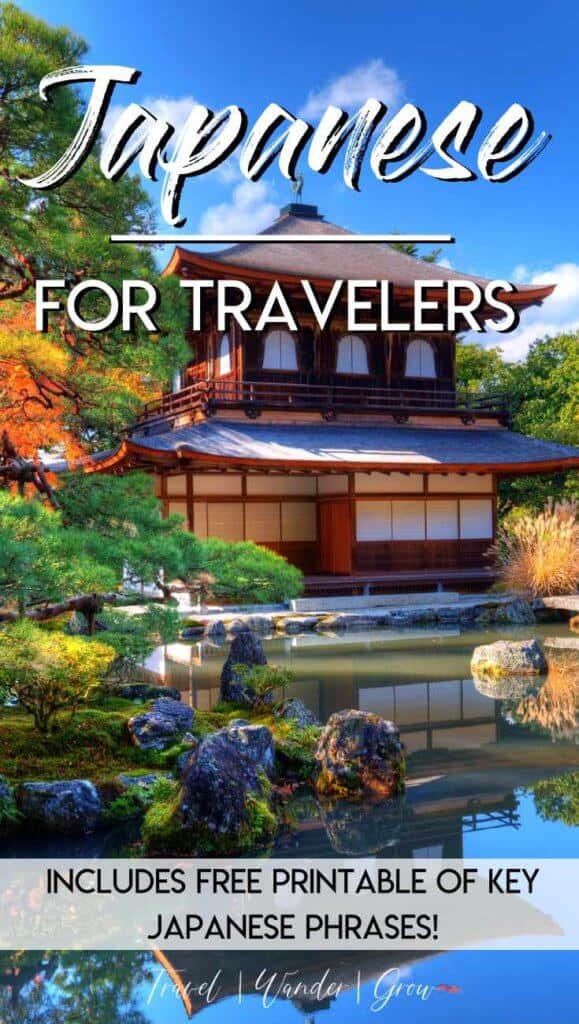
Christen Thomas is the founder of TravelWanderGrow, established in 2018. She has lived abroad and traveled extensively to over 30 countries. In addition, she is a certified Travel Advisor and is an expert in planning trips focused on city history and culture. As a frequent traveler, she also shares tips on how to prepare to travel well and how to save money while doing so.
Pinning this for later as we’re hoping to visit Japan in the next few years. Great breakdown of the common phrases. I had a Japanese roommate in high school so I’ve heard a lot of these phrases, but never knew how to spell them – so interesting!
Glad you have found the guide helpful, Emily! Hope you get to practice the phrases soon :).
I am Korean-American & can speak conversational Korean. I feel I would be able to easily pickup Japanese but they seem to talk so fast! Thanks for sharing this post! My husband & I hope to visit Japan later this fall…it will come handy!
Doesn’t it always seem that others speak so fast when you are learning a language? Hopefully you can put these to good use on your trip to Japan!
Very useful and interesting. Thank you! Keep it coming
Glad you found it helpful, Oliver!
Leave a Reply Cancel reply
Your email address will not be published. Required fields are marked *
- Skip to primary navigation
- Skip to main content
- Skip to primary sidebar
- Skip to footer
StoryLearning
Learn A Language Through Stories
83 Must-Know Japanese Travel Phrases For Your Next Trip To Japan
If you're learning Japanese and considering a trip to Japan, you'll probably want to learn some Japanese travel phrases so you can make the most of your trip.
Getting a feel for which expressions will be most important to you can vary depending upon your specific interests and goals while traveling. But some vocab is particularly useful no matter what.
If you spend time learning any basic Japanese phrases and words, start with these 83 Japanese travel phrases so that you can head into Japan on the right foot!
Regardless of where you are or what you’re doing, two of the most important words you’ll need to know are arigatou gozaimasu and sumimasen .
Arigatou (gozaimasu ) means “thank you,” and it’s very polite; you can use it with anyone. Sumimasen means “excuse me” (when trying to get someone’s attention) or “I’m sorry” (if you’ve inconvenienced someone, such as by misunderstanding or taking up time).
Let's discover the other Japanese travel phrases that will be a must on your next trip to Japan.
By the way, if you want to learn Japanese fast and have fun while doing it, my top recommendation is Japanese Uncovered which teaches you through StoryLearning®.
With Japanese Uncovered you’ll use my unique StoryLearning® method to learn Japanese naturally through story… not rules. It’s as fun as it is effective.
If you’re ready to get started, click here for a 7-day FREE trial.
At The Airport
So you have arrived in Japan, and you’re in the airport. Depending on how your travels went and what you’re planning on doing next, you might have multiple places you need to visit.
To start, review your vocab and see if any of these locations apply to you for your next stop:
#1 currency exchange ( ryougaejo 両替所) #2 toilet ( toire トイレ) #3 customs ( zeikan 税関) #4 immigration ( nyuukoku shinsa 入国審査) #5 information ( desksougou annaijo 総合案内所) #6 souvenir shop ( omiyageya お土産屋) #7 Seat ( seki 席) #8 Train ( densha 電車) #9 Taxi ( takushi タクシー)
These are the most likely places you’ll need to stop next once you arrive. If you need to locate a certain establishment or find where to go, you can always ask someone:
#10 Where is the ______? (____ ha doko desu ka? __はどこですか。)
After you conclude your business wandering around the airport, you’ll probably be heading out into the city. In order to do that, you’ll most likely need to take a train out of the airport. If you feel confident using the airport’s self-service ticket machines, you can buy your own ticket.
However, if you have a JR Pass or need to use special train services, or if you don’t know how to use the machines, you can approach the manned ticket counter and ask:
#11 Can I have a ticket to _______ please? (____ made no chiketto wo kudasai. __までのチケットをください。)
If you are concerned that you may have to change trains during the process, you can ask about this too by saying:
#12 Is there a transfer? ( Norikae ha arimasu ka? 乗り換えはありますか。)
Taking A Taxi
Taxis in Japan are much more economical options than people give them credit for, so if you’re overwhelmed about navigating by yourself, a taxi can be a great option. The vocabulary for taking a taxi is simple, and drivers typically go above and beyond to help you.
#13 Taxi ( takushi タクシー)
When you have located the taxis, you will see that they typically drive up in a line. Wait your turn, and when one drives up, approach. Remember: do not open or close the taxi doors yourself; the driver has an automated button to do this for you.
#14 I’d like to go to _____, please. (____ made onegaishimasu __までお願いします) #15 How much does it cost? ( Ikura desu ka? いくらですか。)
One important thing to remember is that Japan is a very cash-centric society . The use of credit cards is much rarer than you may be used to, so you should plan to carry larger than normal amounts of cash with you in general. This also means that you should be prepared to ask your taxi driver if he or she accepts credit cards at all.
#16 Is paying by credit card okay? ( Kurejitto kaado de ii desu ka? クレジットカードでいいですか。)
Checking Into Your Hotel
So you have taken a taxi or train, and you’ve arrived at your hotel. Hotels have a wide array of commodities that you can take advantage of, which means that you’ll also get to use a lot of unique vocabulary.
Check out some of the words you’re most likely to use:
#17 Key ( kagi 鍵) #18 Front desk ( chouba (but furonto desuku is more common) 帳場 (フロントデスク)) #19 Lobby ( robii ロビー) #20 Dining room ( shokudou 食堂) #21 Hall ( rouka 廊下) #22 Towel ( taoru タオル) #23 Soap ( sekken 石鹸) #24 Toothbrush ( ha-burashi 歯ブラシ) #25 Toothpaste ( ha-migaki 歯磨き) #26 Razor ( kamisori かみそり) #27 Television ( terebi テレビ) #28 Housekeeping ( kaji-gakari かじがかり) #29 Laundry ( sentaku 選択)
If you are looking to do laundry at a hotel, be aware that Japanese dryers are not as powerful as most countries’, so you may need to run the dryer multiple times or simply hang your clothes to dry.
When you are ready to check in, you can approach the front desk. Depending on what you need to do next, you can use phrases such as:
#30 I’d like to check in. ( Chekku in wo onegaishimasu .チェックインをお願いします。) #31 My name is _______. ( Namae wa _____desu .名前あ___です。) #32 I’d like to make a reservation. ( Yoyaku wo shitai desu .予約をしたいです。) #33 Is there wifi? ( Wi-Fi ga arimasu ka? WIFIがありますか。) #34 What time is checkout? ( Chekku auto wa nanji desu ka? チェックアウトは何時ですか。`) #35 Can you hold my luggage for me? ( Nimotsu wo koko ni oite itte mo ii desu ka? 荷物はここに置いていってもいいですか。)
Japanese Greetings
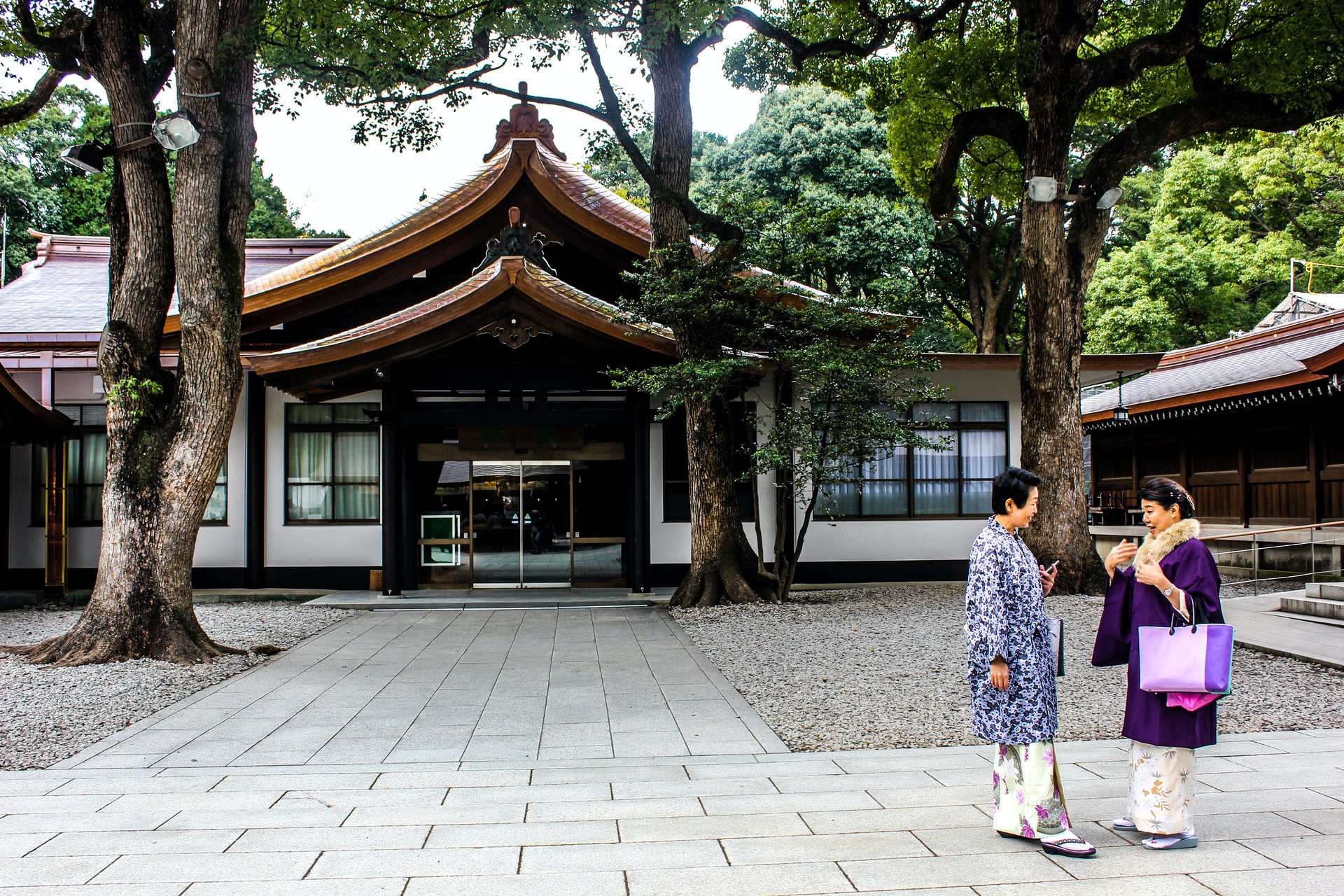
Now that you have settled into Japan a little bit, you’ll probably enjoy going for a walk to see the sights. As you interact with other people, the phrases you’re most likely to hear them say are:
#36 Ohayou/konnichiwa/konbanwa
These are the “daily” greetings that mean “hello.” Ohayou (good morning) is typically used until about 11:30 or noon, then people switch to konnichiwa (good afternoon). At about 5pm, most people will switch to konbanwa (good evening).
#37 Itterasshai/Okaeri
When you leave and return for the day, you may be greeted with unique phrases. Itterasshai means “have a safe trip” or simply “goodbye for the day,” said as you leave. Your hotel staff may say this to you. They may also greet you with okaeri (welcome back) when you return.
#38 Irasshaimase
Whenever you enter a business, you’ll likely be greeted with irasshaimase , a very formal welcome. You are not expected to say anything in response; it’s sort of like the staff saying hello while also thanking you for shopping or visiting.
Buying Coffee
If you can’t go a day without your morning brew, take heart—Japanese coffee shops are everywhere, and the vocabulary is actually almost identical to what you may be used to ordering.
#39 Coffee shop ( kissaten 喫茶店) #40 Hot coffee ( hotto kohi ホットコーヒー) #41 Iced coffee ( aisu kohi アイスコーヒー) #42 Cafe latte ( kafe rate カフェラテ) #43 Drip coffee ( dorippu kohi ドリップコーヒー) #44 Soy milk ( soi miruku ソイミルク)) #45 Espresso ( Esupuresso エスプレッソ)
When it comes time to order your drink, you can specify what you want via the following format:
#46 I’d like to order [number] of [item]. ([item] wo [number] onegaishimasu .[item] を [number]お願いします。)
The [item] can be kohi, mizu (water), or any other item you would like to order. If you don’t know how to say what you want to order, you can point to a menu and simply say “kore” (this) in the [item] place. You can fill the [number] slot with the quantity you would like; the words hitotsu, futatsu , and mitsu mean one, two, and three, respectively.
For example:
- I’d like one hot coffee, please. ( Hotto kohi wo hitotsu onegaishimasu. )
After this, the waitress may ask what size you would like. You can typically choose from small (S), medium (M), and large (L).
Use the letter to indicate which size you would like:
#47 Size ( saizu サイズ) #48 Medium M ( saizuM サイズ)
In A Japanese Restaurant
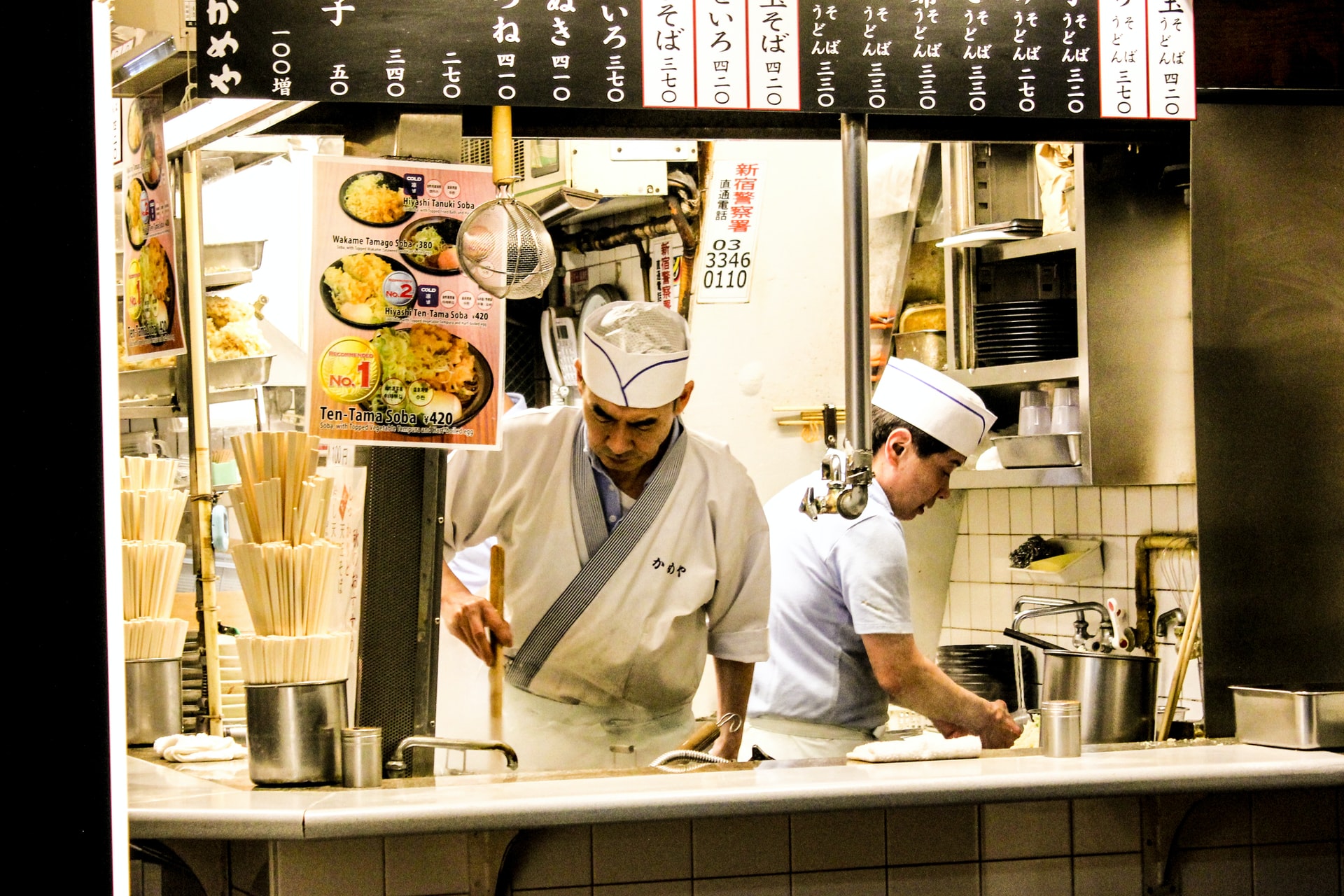
If you’ve decided to stop by a Japanese restaurant instead of a café, you might need a wider variety of words to make sure you can get by.
The good news is that many restaurants—especially in large cities—have pictures on their menus, and no one will be upset if you point and simply say “this, please.”
To start, the vocabulary you’re most likely to need include:
#49 Fish ( sakana 魚) #50 Meat ( niku 肉) #51 Vegetables ( yasai 野菜) #52 Vegetarian ( begitarian ベジタリアン) #53 Beer ( biiru ビール) #54 Water ( mizu 水) #55 Tea ( ocha お茶)
As you enter a restaurant, you will likely be asked how many people are in your party. Using basic Japanese numbers 1-10, you can create the following sentence:
#56 There are [number] people. ([number] mei desu .___名です)
Once you have been seated, you may need to use some of the following phrases:
#57 Do you have an English menu? ( Eigo no menyu arimasu ka? 英語のメニューありますか。) #58 What is this [while pointing]? ( Kore ha nan desu ka? これは何ですか。)
When you have decided what you would like to order, you can simply state:
#59 [item] please. (____ onegaishimasu .__お願いします。)
If you do not know the name of the item and would like to order just by pointing at the menu, you can use:
#60 I’d like to order [number] of [item]. ([item] wo [number] onegaishimasu .[item] を [number]お願いします。)
When your meal is over, your next step is to pay. Important phrases that can get you through this phase of the interaction include:
#61 Could we have the bill, please? ( Okaikei kudasai. お会計ください。) #62 Can I pay with a credit card? ( Kurejitto kaado de daijoubu desu ka? クレジットカードで大丈夫ですか。)

In A Convenience Store
If you don’t feel like stopping by a restaurant, or if you’d just like a quick bite to eat or other item, the thousands of convenience stores (called konbini , short for konbiniensu sutoa , “convenience store”) that appear on nearly every street corner are ready to serve you.
The easiest meals in terms of simplicity will be bento boxes, or small boxes (in the cold section) that serve as a whole meal. If you pick one of those up and stand in line, you will almost always hear the following three phrases (to which you can answer yes or no, which keeps things simple):
#63 Next in line, please! ( Otsugi no kata douzo! お次の方どうぞ。) #64 Do you have a point card [a rewards card for the convenience store]? ( Pointo ka-do ha omochi desu ka? ポイントカードはお持ちですか。) #65 Would you like your bento warmed up? ( Obento atatamemasu ka? お弁当温めますか。)
Getting Directions And Getting Lost
Almost inevitably, you’ll find yourself turned around once you start exploring. That’s not such a bad thing! Japan is full of small, tucked away secrets, and the people are eager to help you get back to a familiar place much more often than not.
If you need to ask directions, the phrases that will serve you best are:
#66 Where is [place]?( ____ ha doko desu ka? __ はどこですか。) #67 Can I ask you for directions? ( Michi wo kiite mo ii desu ka? 道を聞いてもいいですか。) #68 Can you help me? ( Tasukete kudasaimasen ka? 助けてくださいませんか。)
In response, Japanese people are likely to use the following words:
#69 Next ( totonari となり) #70 In front of ( mae 前) #71 Behind ( ushiro 後ろ) #72 Nearby ( chikaku 近く) #73 North ( kita 北) #74 South ( minami 南) #75 East ( higashi 東) #76 West ( nishi 西) #77 Right ( migi 右) #78 Left ( hidari 左) #79 Street/road/path ( michi 道) #80 Bridge ( hashi 橋) #81 Corner ( kado 角)
Thanks to the consistent presence of trains and other forms of public transport, you should feel emboldened to explore as much as you like. There will always be a train station or bus nearby where you can ask directions or head back to a familiar place!
Japanese Travel Phrases
So there you have it – 83 Japanese travel phrases to hit the ground running on your next trip to Japan. From the airport to the convenience store and from the hotel to Japanese restaurants these knowing these Japanese travel phrases will help you feel less like a tourist.
And who knows, maybe getting started with these Japanese travel phrases will be your gateway into learning the language.
By the way, if you'd like to learn some more Japanese phrases before your trip, make sure you check out this post on basic conversational Japanese for your first chat with a native speaker. You might also like this list of Japanese conversation starters.
Language Courses
- Language Blog
- Testimonials
- Meet Our Team
- Media & Press
Our website uses cookies to provide you the best experience. By continuing to use our website, you agree to our use of cookies. For more information, read our Cookie Policy .
Download this article as a FREE PDF ?
What is your current level in Swedish?
Perfect! You’ve now got access to my most effective [level] Swedish tips…
Where shall I send the tips and your PDF?
We will protect your data in accordance with our data policy.
What is your current level in Danish?
Perfect! You’ve now got access to my most effective [level] Danish tips…
NOT INTERESTED?
What can we do better? If I could make something to help you right now, w hat would it be?
Which language are you learning?
What is your current level in [language] ?
Perfect! You’ve now got access to my most effective [level] [language] tips, PLUS your free StoryLearning Kit…
Where shall I send them?
Download this article as a FREE PDF?
Great! Where shall I send my best online teaching tips and your PDF?
Download this article as a FREE PDF ?
What is your current level in Arabic?
Perfect! You’ve now got access to my most effective [level] Arabic tips…
FREE StoryLearning Kit!
Join my email newsletter and get FREE access to your StoryLearning Kit — discover how to learn languages through the power of story!
Download a FREE Story in Japanese!
Enter your email address below to get a FREE short story in Japanese and start learning Japanese quickly and naturally with my StoryLearning® method!
What is your current level in Japanese?
Perfect! You’ve now got access to the Japanese StoryLearning® Pack …
Where shall I send your download link?
Download Your FREE Natural Japanese Grammar Pack
Enter your email address below to get free access to my Natural Japanese Grammar Pack and learn to internalise Japanese grammar quickly and naturally through stories.
Perfect! You’ve now got access to the Natural Japanese Grammar Pack …
What is your current level in Portuguese?
Perfect! You’ve now got access to the Natural Portuguese Grammar Pack …
What is your current level in German?
Perfect! You’ve now got access to the Natural German Grammar Pack …
Train as an Online Language Teacher and Earn from Home
The next cohort of my Certificate of Online Language Teaching will open soon. Join the waiting list, and we’ll notify you as soon as enrolment is open!
Perfect! You’ve now got access to my most effective [level] Portuguese tips…
What is your current level in Turkish?
Perfect! You’ve now got access to my most effective [level] Turkish tips…
What is your current level in French?
Perfect! You’ve now got access to the French Vocab Power Pack …
What is your current level in Italian?
Perfect! You’ve now got access to the Italian Vocab Power Pack …
Perfect! You’ve now got access to the German Vocab Power Pack …
Perfect! You’ve now got access to the Japanese Vocab Power Pack …
Download Your FREE Japanese Vocab Power Pack
Enter your email address below to get free access to my Japanese Vocab Power Pack and learn essential Japanese words and phrases quickly and naturally. (ALL levels!)
Download Your FREE German Vocab Power Pack

Enter your email address below to get free access to my German Vocab Power Pack and learn essential German words and phrases quickly and naturally. (ALL levels!)
Download Your FREE Italian Vocab Power Pack
Enter your email address below to get free access to my Italian Vocab Power Pack and learn essential Italian words and phrases quickly and naturally. (ALL levels!)
Download Your FREE French Vocab Power Pack
Enter your email address below to get free access to my French Vocab Power Pack and learn essential French words and phrases quickly and naturally. (ALL levels!)
Perfect! You’ve now got access to the Portuguese StoryLearning® Pack …
What is your current level in Russian?
Perfect! You’ve now got access to the Natural Russian Grammar Pack …
Perfect! You’ve now got access to the Russian StoryLearning® Pack …
Perfect! You’ve now got access to the Italian StoryLearning® Pack …
Perfect! You’ve now got access to the Natural Italian Grammar Pack …
Perfect! You’ve now got access to the French StoryLearning® Pack …
Perfect! You’ve now got access to the Natural French Grammar Pack …
What is your current level in Spanish?
Perfect! You’ve now got access to the Spanish Vocab Power Pack …
Perfect! You’ve now got access to the Natural Spanish Grammar Pack …
Perfect! You’ve now got access to the Spanish StoryLearning® Pack …
Where shall I send them?
What is your current level in Korean?
Perfect! You’ve now got access to my most effective [level] Korean tips…
Perfect! You’ve now got access to my most effective [level] Russian tips…
Perfect! You’ve now got access to my most effective [level] Japanese tips…
What is your current level in Chinese?
Perfect! You’ve now got access to my most effective [level] Chinese tips…
Perfect! You’ve now got access to my most effective [level] Spanish tips…
Perfect! You’ve now got access to my most effective [level] Italian tips…
Perfect! You’ve now got access to my most effective [level] French tips…
Perfect! You’ve now got access to my most effective [level] German tips…
Download Your FREE Natural Portuguese Grammar Pack
Enter your email address below to get free access to my Natural Portuguese Grammar Pack and learn to internalise Portuguese grammar quickly and naturally through stories.
Download Your FREE Natural Russian Grammar Pack
Enter your email address below to get free access to my Natural Russian Grammar Pack and learn to internalise Russian grammar quickly and naturally through stories.
Download Your FREE Natural German Grammar Pack
Enter your email address below to get free access to my Natural German Grammar Pack and learn to internalise German grammar quickly and naturally through stories.
Download Your FREE Natural French Grammar Pack
Enter your email address below to get free access to my Natural French Grammar Pack and learn to internalise French grammar quickly and naturally through stories.
Download Your FREE Natural Italian Grammar Pack
Enter your email address below to get free access to my Natural Italian Grammar Pack and learn to internalise Italian grammar quickly and naturally through stories.
Download a FREE Story in Portuguese!

Enter your email address below to get a FREE short story in Brazilian Portuguese and start learning Portuguese quickly and naturally with my StoryLearning® method!
Download a FREE Story in Russian!
Enter your email address below to get a FREE short story in Russian and start learning Russian quickly and naturally with my StoryLearning® method!
Download a FREE Story in German!
Enter your email address below to get a FREE short story in German and start learning German quickly and naturally with my StoryLearning® method!
Perfect! You’ve now got access to the German StoryLearning® Pack …
Download a FREE Story in Italian!
Enter your email address below to get a FREE short story in Italian and start learning Italian quickly and naturally with my StoryLearning® method!
Download a FREE Story in French!

Enter your email address below to get a FREE short story in French and start learning French quickly and naturally with my StoryLearning® method!
Download a FREE Story in Spanish!
Enter your email address below to get a FREE short story in Spanish and start learning Spanish quickly and naturally with my StoryLearning® method!
FREE Download:
The rules of language learning.

Enter your email address below to get free access to my Rules of Language Learning and discover 25 “rules” to learn a new language quickly and naturally through stories.
What can we do better ? If I could make something to help you right now, w hat would it be?
What is your current level in [language]?
Perfect! You’ve now got access to my most effective [level] [language] tips…
Download Your FREE Spanish Vocab Power Pack

Enter your email address below to get free access to my Spanish Vocab Power Pack and learn essential Spanish words and phrases quickly and naturally. (ALL levels!)
Download Your FREE Natural Spanish Grammar Pack
Enter your email address below to get free access to my Natural Spanish Grammar Pack and learn to internalise Spanish grammar quickly and naturally through stories.
Free Step-By-Step Guide:
How to generate a full-time income from home with your English… even with ZERO previous teaching experience.
What is your current level in Thai?
Perfect! You’ve now got access to my most effective [level] Thai tips…
What is your current level in Cantonese?
Perfect! You’ve now got access to my most effective [level] Cantonese tips…
Steal My Method?
I’ve written some simple emails explaining the techniques I’ve used to learn 8 languages…
I want to be skipped!
I’m the lead capture, man!
Join 84,574 other language learners getting StoryLearning tips by email…
“After I started to use your ideas, I learn better, for longer, with more passion. Thanks for the life-change!” – Dallas Nesbit
Perfect! You’ve now got access to my most effective [level] [language] tips…
Perfect! You’ve now got access to my most effective [level] [language] tips…
Join 122,238 other language learners getting StoryLearning tips by email…
Find the perfect language course for you.
Looking for world-class training material to help you make a breakthrough in your language learning?
Click ‘start now’ and complete this short survey to find the perfect course for you!
Do you like the idea of learning through story?
Do you want…?

73+ Essential Japanese Travel Phrases for Tourists Visiting Japan & Free cheat sheet
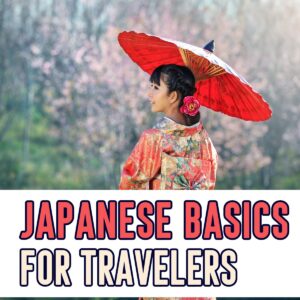
Disclosure: This essential Japanese travel phrases for tourists article may contain affiliate links. If you click it and buy something you like, I’ll earn a small commission at no extra cost to you. Thank you! Read more in Disclaimer .
Going to Japan? Searching for essential Japanese travel phrases for tourists ? Look no further! When in Japan, being familiar with common Japanese phrases for tourists will be beyond helpful! Trust me! I have been to Japan and knowing basic Japanese phrases helped me to enjoy exploring the vibrant streets of Tokyo , serene temples of Kyoto , or the natural beauty of Mount Fuji during sakura.
Before you travel to the land of the rising Sun, learn Japanese travel phrases which will help to order ramen, and to deepen your understanding of Japanese culture and their way of life. Curious, what are some common phrases I need to learn before my trip to Japan ?
🥘 If you have been wondering “What is Anja’s favorite Japanese food?”, you will find the answer hidden in the blog.

Japan is one of the most sought-after and visited countries in Asia, known for its fascinating blend of tradition and modernity, breathtaking landscapes, and renowned cuisine. Especially popular in Spring at sakura or in Autumn for fall foliage. There are people in Japan, who speak English. But it is not as common as you would think. Thus, japanese phrases to know when traveling will come in handy. By knowing basic Japanese words you will also be able to show respect to the locals. In this common travel phrases Japanese language guide , you are going to find useful phrases in Japanese for tourists. From typical Japanese phrases for greetings, Japanese hotel phrases and Japanese words for simple conversation. Inside the post you will also find a FREE Japanese travel phrases pdf , that you can download and bring with you to Japan. Let’s begin your Japanese adventure by learning essential Japanese phrases for travel .
for ESSENTIAL TRAVEL PHRASES: • 73+ Essential ENGLISH Travel Phrases and Words You Should Know • 73+ Essential ARABIC Travel Phrases for Tourists in Arab Countries & Free PDF • 73+ Essential GREEK Travel Phrases for Tourists on a Greek Holiday & Download • 73+ Essential JAPANESE Travel Phrases for Tourists Visiting Japan & Free cheat sheet • 73+ Essential SLOVENIAN Travel Phrases for your trip to Slovenia & Free Download • 73+ Essential SWAHILI Travel Phrases for Travelers to East Africa + Free Download for WORDS & PHRASES in 101 different languages: • How to say You have beautiful eyes in 101 different languages • How to say What is the WiFi password in 101 different languages • How to say Hello in 101 different languages spoken around the World • How to say Love in 101 different languages spoken around the World • How to say I love you in 101 different languages spoken around the World • How to say Thank you in 101 different languages spoken around the World • How to say Happy Birthday in 101 different languages spoken In the World • How to say Happy New Year in 101 different languages spoken around the World • How to say Friend in 101 different languages spoken around the World with Pronunciation
for general JAPAN TRAVEL TIPS: • GET OVER JET LAG WITH THESE 19 EASY-TO-FOLLOW TIPS • ULTIMATE TRAVELER SAFETY GUIDE: WHAT TO DO DURING AN EARTHQUAKE for JAPAN TIPS: • Ultimate List of 23 Best Apps for Travel to Japan • JAPAN COST OF TRAVEL AND DETAILED BUDGET BREAKDOWN • HOW TO SPEND SEVENTEEN DAYS IN JAPAN: FIRST TIME ITINERARY • 73+ Essential Japanese Travel Phrases for Tourists Visiting Japan & Free cheat sheet for best TOURS IN JAPAN: • TOP 5 RAMEN TOURS IN TOKYO TO UNLOCK YOUR TASTEBUDS • 10 STUNNING JAPAN CHERRY BLOSSOM TOURS THAT YOU WILL ABSOLUTELY LOVE for INSTAGRAM CAPTIONS about JAPAN: • 55 BEST KYOTO CAPTIONS FOR INSTAGRAM – GOLDEN AND KAWAII • 55 BEST TOKYO CAPTIONS FOR INSTAGRAM – KAWAII AND CUTE • 73 Best Ramen Captions for Instagram – Delicious Like Broth • 87 Simplistic Cherry Blossom Captions for Sakura – Sweet and Dreamy • 135 Best Japan Captions for Instagram – Puns, Quotes, Riddles & Jokes
Table of Contents
📌 Don’t have time for a quiz now? Pin i t for later!
Don’t have time to read now? Pin it for later!
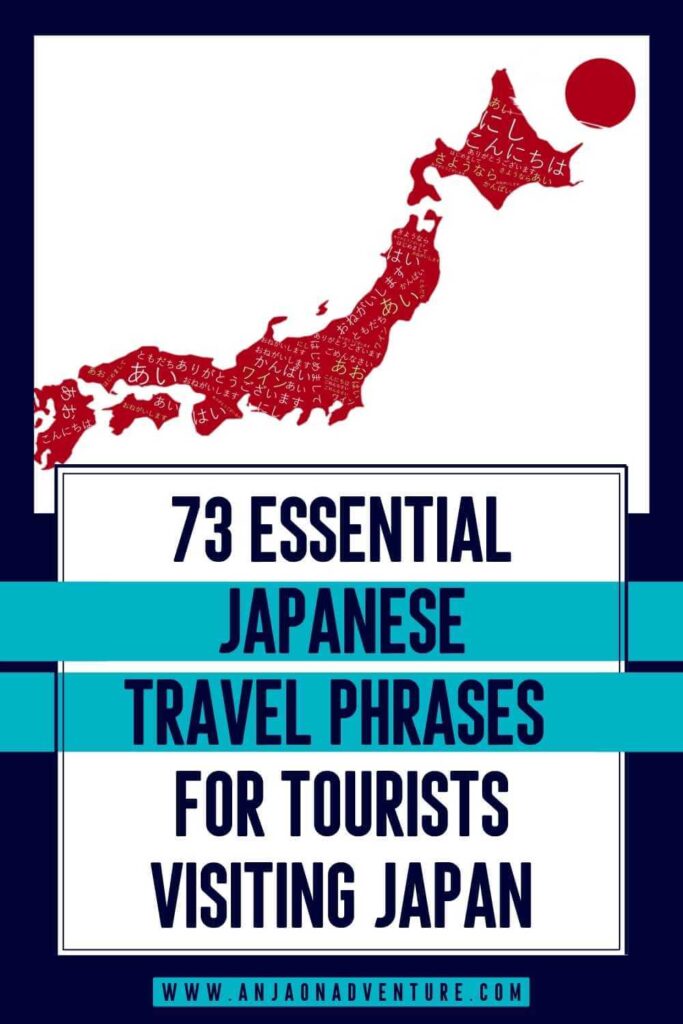
1. Where is Japanese spoken?
Did you know that more than 125 million people speak Japanese? Japanese is primarily spoken in Japan. It is the official language of Japan and is spoken by the majority of the population there. Due to globalization and the popularity of Japanese culture, Japanese is studied and spoken by learners in many countries worldwide. There are Japanese-speaking communities in countries around the world, particularly in the United States, Brazil, Canada, Australia, and the Philippines. The best way to learn Japanese for travel is by using apps like Duolingo or Memrise. If your Japan itinerary is longer than 2 weeks, maybe sign up for a language course. To master the basic Japanese phrases for conversation the best way would be going on a language exchange but if you don’t have time, just download Japanese cheat sheet in this blog post.

2. Japanese language basics: alphabet and pronunciation
Before you start learning common Japanese phrases for tourists, you have to familiarize yourself with the basics of the Japanese language . The Japanese writing system consists of three alphabets: Hiragana, Katakana, and Kanji . Hiragana and Katakana are native to Japan. They both use 46 characters , each representing one syllable and a specific phonetic sound . Hiragana is used for native Japanese words and Katakana for words borrowed from foreign languages. Kanji is a writing system borrowed from China, where each ideogram stands for a certain meaning and can have multiple pronunciations. Don’t get scared, let me tell you that Japanese alphabet has fewer letters than English alphabet, 21 in total. It uses the same sounds that you use in the English language. Each character represents a specific sound , and once you grasp the sounds, you will be able to read and pronounce Japanese with ease. Below you will find a guide for Hiragana and Katakana symbols and a similar sound in English language.
Pinning is winning and sharing is caring! What are you choosing?
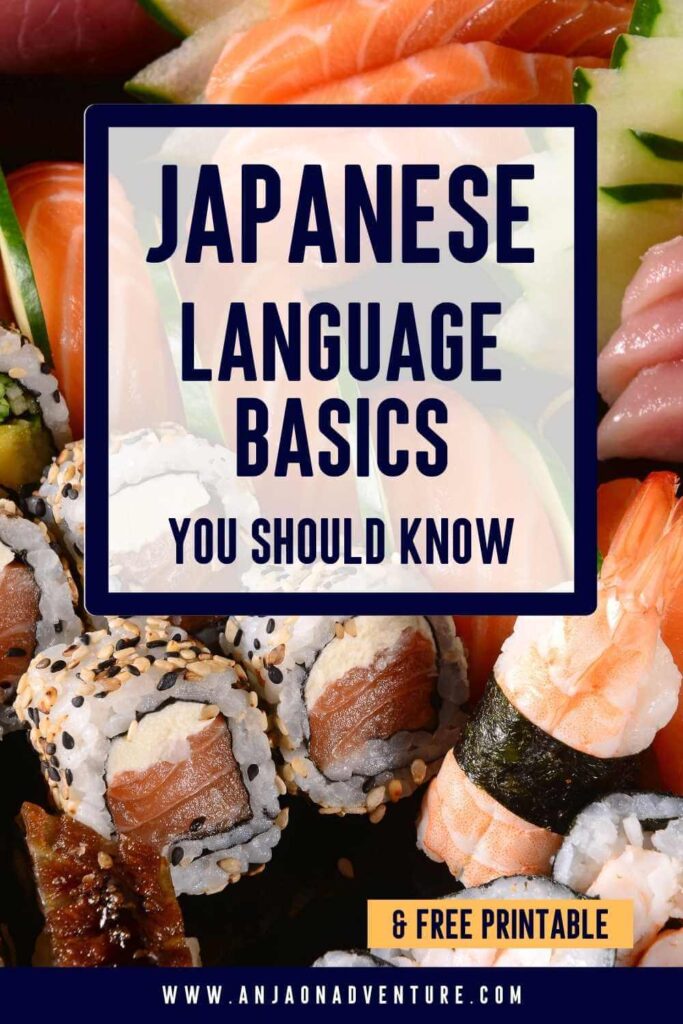
3. Essential Japanese travel phrases
3.1. basic japanese phrases for travelers.
Basic Japanese phrases for conversation that showcase politeness and cultural respect, encouraging positive interactions with locals and are a base for every communication. Those are basic phrases to know when visiting Japan.
ALSO READ: • HOW TO SPEND SEVENTEEN DAYS IN JAPAN: FIRST TIME ITINERARY
3.2. Essential Japanese phrases for greetings and introductions
Japanese words and phrases for greetings lay the foundation for any interaction, allowing you to initiate conversations and make a positive first impression. They are easy Japanese words to learn.
ALSO READ: • How to say You have beautiful eyes in 101 different languages around the World
3.3. Essential Japanese travel phrases for directions and getting around
Japanese travel phrases when asking for directions will enable you to navigate unfamiliar streets and find your way around.
ALSO READ: • Japan Cost of Travel and Detailed Budget Breakdown
3.4. Useful Japanese phrases for tourists when ordering food and drinks
Japanese language phrases for ordering meals, asking for recommendations, and specifying dietary preferences ensure enjoyable dining experiences and help you explore local cuisines.

3.5. Essential phrases in Japanese for shopping
Japanese basics terms for inquiring about prices, negotiating, and Japan tourist phrases for asking for sizes or colors are handy when exploring markets and boutiques.
ALSO READ: • Ultimate List of 23 Best Apps for Travel to Japan
🥘 “What is Anja’s favorite Japanese food?” It is ramen. I love ramen and could eat it every day.
3.6. Useful Japanese hotel phrases
Japanese language words and hotel phrases you will need when checking in a hotel, asking for towels, fixing air conditioning, enquiring what time is breakfast, and what is included in your room rate.
ALSO READ: • How to say Thank you in 101 different languages in the World
3.7. Survival Japanese phrases and Japanese travel terms in case of emergencies
Here you will find helpful Japanese travel terms in case of emergencies, natural disasters, or if you will be needing assistance in difficult or dangerous situations.
ALSO READ: • Best Japan Captions for Instagram – Puns, Quotes, Riddles & Jokes
3.8. Beyond tourist Japanese phrases
If you’re like me and really love learning a few phrases in new languages, expand your study beyond the essential travel phrases . I always learn how to say please and thank you, never visit a country without knowing the local word for “coffee” and never leave without knowing how to say;

4. Best language App for traveling abroad
Learning a language is a long process. If you think you won’t have time to learn basic Japanese phrases , or if the situations come your way when above mentioned Japanese travel phrases won’t be enough, use Google Translate. This is my favorite language app, that I use on (almost) every trip.
4.1. Google Translate
Google Translate is the most popular language travel app that can be used everywhere. I personally use it on all my travels, when going to Tanzania to learn what some Swahili words mean, when in Mexico to help with my not-the-best Spanish, when in Italy, in Japan and other places. I’m sure you are familiar with the language app already. The most obvious feature is it will help you translate the destination language into your own one. But the absolute best feature is that it can translate the text using ‘ camera translation ’. All you have to do is open the app, point your camera toward the text in a foreign language and Google Translate will do the rest. Perfect for menus! It also translates text from the photos on your camera roll. And it also works offline, when you download the language pair on your phone. Language: 133 languages Download: iOS | Android | Website Price: Free
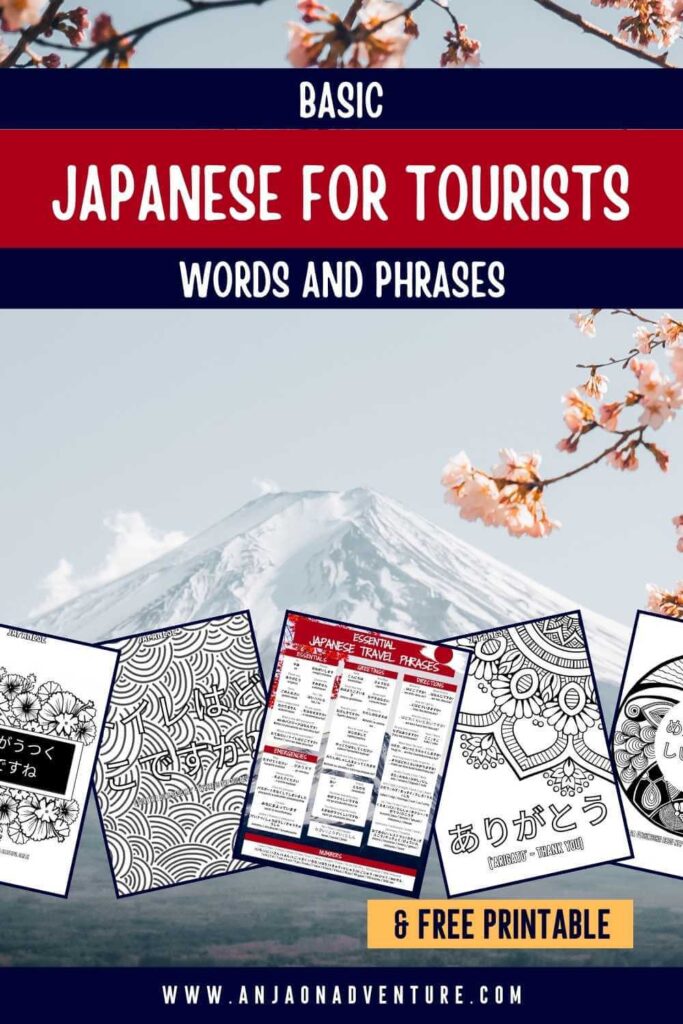
5. Final Thoughts on Essential Japanese Travel Phrases for Tourists
Whether it’s a warm greeting, ordering a meal, or expressing gratitude, this travel japanese guide and Japanese for tourists not only open doors to easier communication, but also show respect and will help you to understand Japanese culture in a different way. Before traveling to Nippon, learn Japanese words for tourists that will help you to navigate through this modern but culturally entwined land, full of history, sushis, shrines, and geishas. How to say Hello in Japanese and how to say thank you in Japanese language. Basic Japanese phrases for directions, ordering food, and checking in a hotel. And don’t forget to download Japanese travel cheat sheet . Which of these must know Japanese phrases for travel have you managed to memorize so far? Let me know in the comments! Safe travels = 安全な旅行 [anzen’na ryokō], Anja
➤ What you should read next …
• How to spend 17 days in Japan • Japan Cost of Travel and Detailed Budget Breakdown • Ultimate List of 23 Best Apps for Travel to Japan • 135 Best Japan Captions for Instagram – Puns, Quotes, Riddles & Jokes • How to say Hello in 101 different languages
📌 Lik e it? Pin it!

✈ Travel like a PRO
Are you ready to travel like a PRO? Save time and money with these travel tips and resources . I personally use these companies to save time and money. They do the work by providing a list of options, prices, and reviews from actual guests, for anywhere I am traveling worldwide. ✈️ FLIGHTS: I use Skyscanner in combination with Google Flights to find amazing flight fares (try the Explore feature). I book directly with an airline or pair it with Iwantthatflight for the best deals. 🏨 ACCOMMODATION: Booking.com is my favorite site for finding great hotel deals. They return the best rates and reviews are from actual guests! 🚘 RENTAL CARS: Discover Cars are my go-to, when planning an epic road trip. 🗽 TOURS & ACTIVITIES: I like to wander around on my own, but when I want to explore with a group, skip the line with an entrance ticket, I book it with GetYourGuide or Viator . ❤️🩹 TRAVEL INSURANCE: I never, under any circumstances travel without insurance. In most cases, I use yearly global travel medical insurance. But, if you don’t have that and some impromptu travel plans occur, use SafetyWing . With them, you can buy travel insurance even when you are already abroad. Better be safe, than sorry! 📲 ONLINE SAFETY: NordVPN keeps your devices’ browsing safe and malware-free. Stream shows from around the world, access social media in countries where they are blocked and buy cheap flights by changing your virtual location. 🛜 STAY CONNECTED WITH eSIM: Ditch the plastic SIM cards and waiting in lines at the airport! Airalo eSIMs allow you to connect as soon as you land at your destination. They have eSIMs for over 190+ countries worldwide.
Where is Japanese spoken?
Japanese is an official language in Japan. There are some Japanese-speaking communities in various other countries around the world, like the United States, Brazil, Canada and Australia.
How to say Good Morning in Japanese?
おはようございます pronounced as “ohayou gozaimasu” Learn basic Japanese words and quick Japanese phrases easy on Anja On Adventure blog. Here you can also FREE DOWNLOAD Japanese phrases for travelers pdf and key Japanese phrases for tourists.
How to say Thank you in Japanese?
Thank you in Japanese is ありがとうございます, which is pronounced as “ arigatou gozaimasu”. Learn more Japanese language basics and easy Japanese phrases for tourists on Anja On Adventure blog. Here you can also FREE DOWNLOAD basic Japanese travel phrases pdf and coloring pages with Japanese words.
How to say Hello in Japanese?
こんにちは pronounced as “konnichiwa” Learn basic Japanese for tourists and important Japanese phrases for travel on Anja On Adventure blog. Here you can also FREE DOWNLOAD Japanese for travelers pdf and Japan basic words.
How to say My name is in Japanese?
わたしのなまえは …, pronounced as “ Watashi no namae wa …”. Learn Japan travel phrases and top Japanese phrases for tourists on Anja On Adventure blog. Here you can also FREE DOWNLOAD basic Japanese words pdf and Japanese phrases while travelling Japan.
How to say How are you in Japanese?
おげんきですか? , pronounced as “ Ogenki desu ka?” Learn more Japanese phrases to know and basic Japanese phrases for tourists on Anja On Adventure blog. Here you can also FREE DOWNLOAD Japanese phrase cheat sheet pdf and useful kanji for tourists.
How do you say Hi in Japanese?
Hi in Japanese language is やあ , pronounced as “ya”. Learn learn basic Japanese for travel and Japanese phrases for travelling on Anja On Adventure blog. Here you can also FREE DOWNLOAD japanese cheat sheet tourist pdf and Japan phrases for travelers.
❥ About Anja On Adventure

Anja On Adventure is a travel blog, a collection of insider tips and information on destinations, that I visited as a solo female traveler, tour guide, teacher, yacht stewardess, and Survivor challenge tester. Anja, is a thirty-something adventure-seeking, sun chasing, beach hopping, gin-loving, tropics enthusiast with a creative mind and sarcastic spirit, who loves coconut and mango but doesn’t like chocolate and sweets. I am passionate about all things travel, maps, and puzzles. Click here to learn more About me .
About the author: Anja

Japanese Travel Phrases for an Enjoyable Trip to Japan

Are you traveling to Japan and want to learn practical Japanese travel phrases? This article is designed to help you learn the most useful Japanese words for travel.
It’s always good to learn basic words when you travel to a foreign country. Not only does it make getting around easier, but it also allows you to enjoy communicating with the locals.
In general, Japanese people are not so good at speaking English , free wifi services aren’t very prevalent (especially outside of the central cities), and Japan is still more of a cash-based society than you may think. However, Japanese people are very kind; they’ll listen to you patiently and do their best to help. So just use these basic Japanese travel phrases to talk to Japanese people when you want to ask something.
When you speak even a little bit of Japanese, locals will appreciate your effort and will be more friendly. Here’s JapanesePod101’s list of practical Japanese travel phrases for your travels to Japan!
Table of Contents
- Greeting/Communication
- Asking for Directions
- Restaurants
- When You Need Help
- Conclusion: How JapanesePod101 Can Help You Learn More Japanese

1. Greeting/Communication

To begin our list of essential Japanese travel phrases, we’ll go over greetings and basic travel phrases in Japanese for solid communication. These simple Japanese travel phrases can make a world of difference in your conversations and overall experience in Japan.
- Romanization: Kon’nichiwa
- English Translation: Hello
In terms of must-know Japanese travel phrases, you probably already know that this is the most common Japanese greeting word . You can say this to anybody for any occasion during the daytime.
- Romanization: Hai / Iie
- English Translation: Yes / No
Hai is “Yes” and it’s pronounced like the English word “Hi.” In Japan, saying yes also means that you understand. Iie is “No” and it’s pronounced ‘EE-eh.’
3- ありがとうございます
- Romanization: Arigatō gozaimasu
- English Translation: Thank you
Arigatō gozaimasu is the polite way to say “Thank you” in Japanese, and you can use this for any occasion. In case of a casual situation, you can just say Arigatō , or even more casually, Dōmo (どうも) which means “Thanks.”
4- いいえ、いりません
- Romanization: Iie, irimasen
- English Translation: No, thank you.
It literally means “No, I don’t need it,” in Japanese. At a restaurant, say this phrase when a waiter offers to fill your glass of water and you don’t want more.
- Romanization: Sumimasen
- English Translation: I’m sorry / Excuse me
This word is usually used to say “sorry” or “excuse me” . Say this when you bump into someone in a crowd or when you ask someone for directions. Japanese people also use this to mean “thank you,” in some cases, such as when someone picks up something you dropped.
- Romanization: Onegai shimasu
- English Translation: Please
When you request something, it’s polite to say Onegai shimasu . When someone offers you something and says please, she/he would say Dōzo (どうぞ) in Japanese.
- Romanization: Watashi wa XX desu.
- English Translation: I am XX.
Watashi is “I,” wa is “am/is/are,” and desu is a present-tense word that links subjects and predicates; it’s placed at the end of a sentence. You can put your name, or your nationality, such as: Watashi wa Amerika-jin desu (私はアメリカ人です) which means “I am American.”
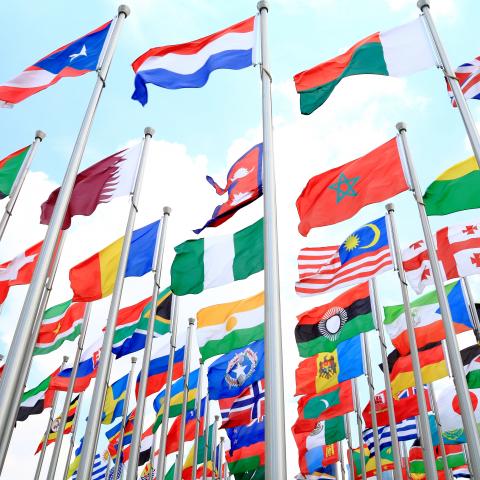
8- 私は日本語がわかりません
- Romanization: Watashi wa nihongo ga wakarimasen.
- English Translation: I don’t understand Japanese.
Nihongo is stands for the Japanese language, and Wakarimasen means “I don’t understand.” If you don’t know something, you can just say Wakarimasen meaning “I don’t know.”
9- 英語を話せますか
- Romanization: Eigo o hanasemasu ka
- English Translation: Can you speak English?
This is one of the most useful Japanese phrases for travelers. Eigo means “English,” Hanasemasu is a polite way to say “I speak,” and ka is a word that you add to the end of a complete sentence to make a question.
10- 英語でお願いします
- Romanization: Eigo de onegai shimasu
- English Translation: English, please.
This is another important Japanese travel phrase. De is the particle, and in this case it means “by” or “by means of.” The phrase literally translates as “English by please.” You can also say M saizu de onegai shimasu (Mサイズでお願いします) which means “Medium size, please.”
2. Asking for Directions

One of the most important Japanese travel phrases you should know are directions . Here are some useful vocabulary words and two Japanese language travel phrases you need to know!
1- Vocabulary
- 駅 ( Eki ) : Station
- 地下鉄 ( Chikatetsu ) : Subway/Metro
- トイレ ( Toire ) : Toilet
- 銀行 ( Ginkō ) : Bank
- 切符売り場 ( Kippu uriba ) : Ticket machine/Office
- 観光案内所 ( Kankō annaijo ) : Tourist information office
- 入口 ( Iriguchi ) : Entrance
- 出口 ( Deguchi ) : Exit
- 右 ( Migi ) : Right
- 左 ( Hidari ) : Left
- まっすぐ ( Massugu ) : Straight
- 曲がる ( Magaru ) : Turn
- 交差点 ( Kōsaten ) : Intersection
- 角 ( Kado ) : Corner
2- XXはどこですか
- Romanization: XX wa doko desu ka
- English Translation: Where is XX?
Doko means “where” and you replace XX with the name of where you want to go.
For example
- Toire wa doko desu ka (Where is the toilet?)
- Deguchi wa doko desu ka (Where is an exit?)
3- XX e wa dō ikeba ii desu ka (XXへはどう行けばいいですか) : How can I go to XX?
- Romanization: XX e wa dō ikeba ii desu ka
- English Translation: How can I go to XX?
Dō is “how,” e is “to,” and ikeba ii can be translated as “good to go.” When you want to know how you can get somewhere, replace XX with where you want to go.
For example:
- Eki e wa dō ikeba ii desu ka (How can I go to the station?)
- Ginkō e wa dō ikeba ii desu ka (How can I go to the bank?)
4- Other Examples
1. この道をまっすぐ行きます ( Kono michi o massugu ikimasu. ):Go straight on this street.
Kono michi is “this street” and ikimasu is the polite way to say “Go.” O is a Japanese postpositional particle which indicates an object (in this case, kono michi ).
2. 次の角を右へ曲がります ( Tsugi no kado o migi e magarimasu. ):Turn right at the next corner.
Tsugi no kado means “next corner” and magarimasu is the polite way to say “Turn.” E is another postpositional particle that indicates direction; this can be translated as the English word “to.”
3. 交差点を渡って左へ行きます ( Kōsaten o watatte hidari e ikimasu. ):Cross an intersection and go to the left (direction).
Watatte is a conjugated form of wataru which means “cross.”
3. Shopping
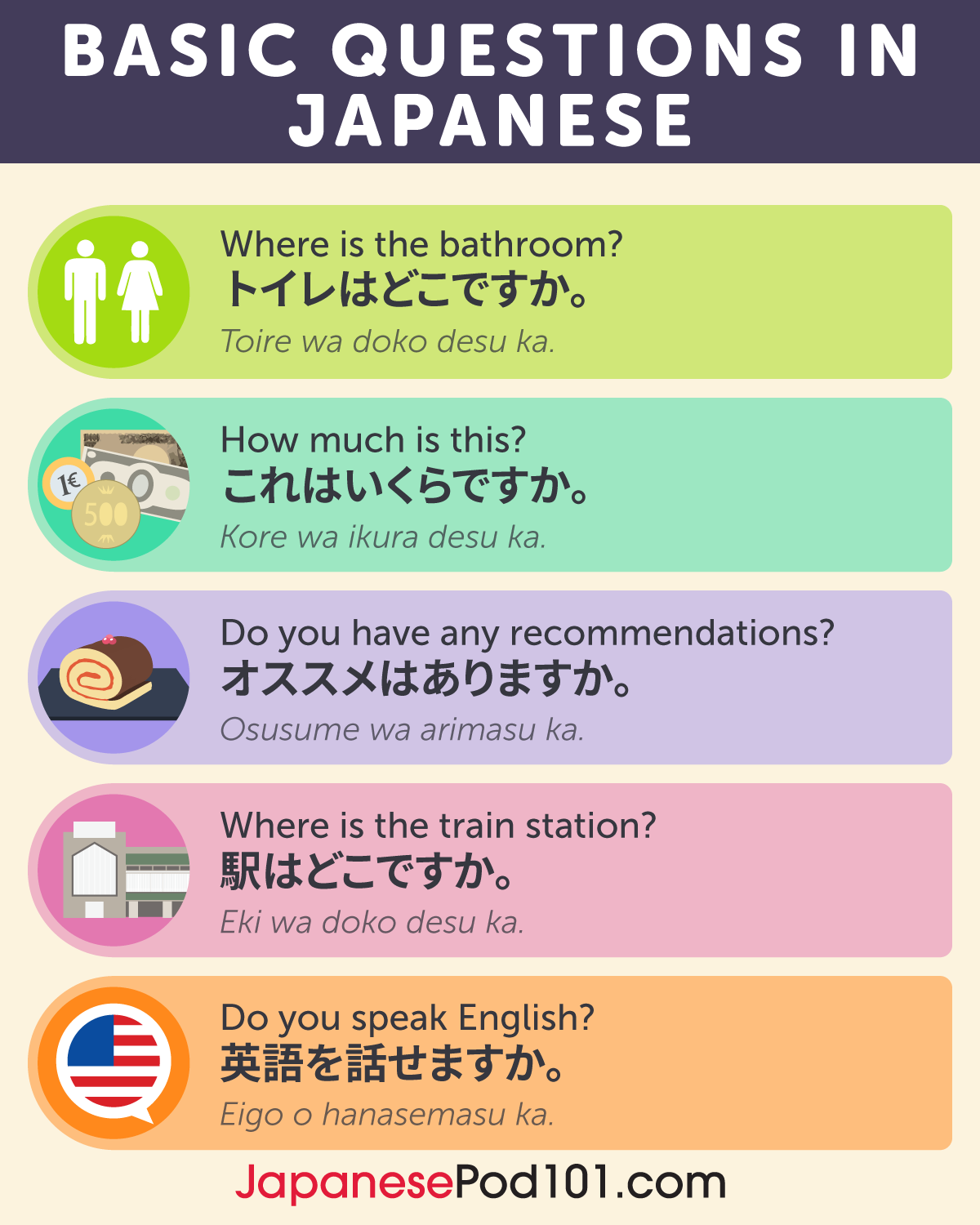
You’ll definitely love shopping when traveling in Japan, and some of the best Japanese phrases for travel are those related to this fun past-time. Knowing some useful Japanese words will make your shopping even more enjoyable.
1- XXはありますか
- Romanization: XX wa arimasu ka
- English Translation: Do you have XX?
When you’re at a store and looking for something, you can use this phrase by replacing XX with what you want.
- Romanization: Ikura desu ka
- English Translation: How much is it?
This is probably one of the most useful Japanese words for traveling and shopping. You can say Ikura desu ka in many situations, such as when you’re shopping, buying tickets, paying for a taxi, etc.
- Romanization: Menzei dekimasu ka
- English Translation: Can you do a tax exemption?
Did you know that, as a traveler, you can get a sales tax exemption when you purchase things greater than 5,000 yen? Menzei is “tax exempted” and dekimasu means “can do.” Don’t forget to say this when you buy something big!
- Romanization: Kore wa nan desu ka
- English Translation: What is this?
Kore is “this” and nan is another form of nani which means “what.” There are many unique foods, gadgets, and things which are unique to Japan, so when you wonder what it is, point to it and say this phrase.
- Romanization: Kore o kaimasu
- English Translation: I’ll buy this.
Kaimasu is the conjugation of the verb kau , which means “buy.”
6- カードは使えますか
- Romanization: Kādo wa tsukaemasu ka
- English Translation: Can I use a credit card?
Kādo is “card” and you pronounce it just like the English word “card.” Tsukaemasu is a conjugation of the potential form of the verb tsukau which means “use.” This phrase is useful when you want to use your card at small shops and restaurants.

4. Restaurants
Japan has an array of delicious foods, of which sushi and ramen are just the tip of the iceberg. Amazingly, Tokyo is the city with the most Michelin-starred restaurants in the world, for several consecutive years. Enjoy yummy food at restaurants with useful Japanese words for restaurants and easy Japanese travel phrases related to food.
- 英語のメニュー ( Eigo no menyū ) : English menu
- ベジタリアンのメニュー ( Bejitarian no menyū ) : Vegetarian menu
- 豚肉を含まないメニュー ( Butaniku o fukumanai menyū ) : Menu without pork
- 水 ( Mizu ) : Water
- 白/赤ワイン ( Shiro / Aka wain ) : White / Red wine
2- XXはありますか
When you want to ask if the restaurant has something you want, say this phrase (replacing XX with what you want).
- Eigo no menyū wa arimasu ka (Do you have an English menu?)
- Aka wain wa arimasu ka (Do you have red wine?)
- Romanization: XX o kudasai
- English Translation: Can I have XX?
This is another very useful phrase. Simply replace XX with what you want. You can also use this versatile phrase in various occasions, such as when shopping, choosing something, etc.
- Kore o kudasai (Can I have this?)
- Mizu o kudasai (Can I have water?)
4- お会計お願いします
- Romanization: O-kaikei onegai shimasu
- English Translation: Check, please.
O-kaikei means “check.” In Japan, people often cross their index fingers in front of their face as a gesture to indicate “check, please” at casual restaurants. However, when you’re at a nice restaurant, simply tell a waiter: O-kaikei onegai shimasu .
5. When You Need Help

Sometimes you get faced with unexpected emergencies while you’re traveling. Japan is famous for being one of the safest countries in the world, but you might fall very ill or be caught in a great earthquake.
1- Vocabularies
- 警察 ( Keisatsu ) : Police
- 病院 ( Byōin ) : Hospital
- 救急車 ( Kyūkyūsha ) : Ambulance
- ドラッグストア/薬局 ( Doraggu sutoa / Yakkyoku ) : Drug Store/Pharmacy
- タクシー ( Takushī ) : Taxi
2- XXを呼んでください
- Romanization: XX o yonde kudasai
- English Translation: Can you call XX?
When you’re severely ill or in case of emergency, let people know by using this phrase. Japanese people will kindly help you.
- Yūkyūsha o yonde kudasai (Can you call an ambulance?)
- Keisatsu o yonde kudasai (Can you call the police?)
3- どこでインターネットを使えますか
- Romanization: Doko de intānetto o tsukaemasu ka
- English Translation: Where can I use the internet?
Although large cities in Japan provide free public wifi at major stations, metros, and cafes, you may need to find internet access in smaller cities. Remember that there will be kind Japanese people who will share their personal hotspots, or look things up for you with their own phones, as well.
4- 電話を貸してください
- Romanization: Denwa o kashite kudasai
- English Translation: Can I use your phone?
Denwa is “phone” and kashite is a conjugation word of kasu , which means “lend.” This phrase is literally translated as “Please lend (me) a phone.”
- Romanization: Tasukete kudasai
- English Translation: Please help me.
I believe this phrase is the last thing you would ever use in Japan, but in case something does happen, this is useful survival Japanese for tourists.

6. Conclusion: How JapanesePod101 Can Help You Learn More Japanese
I hope this article of Japanese travel phrases is helpful and that you’ll enjoy your trip to Japan!
If you would like to learn more about the Japanese language, you’ll find more useful content on JapanesePod101.com . We provide a variety of free lessons for you to improve your Japanese language skills.
We also have YouTube channel: JapanesePod101 . It’s fun to learn Japanese through watching videos and listening to actual Japanese pronunciation, so we recommend you check it out!
Don’t forget to study with our free Japanese vocabulary lists , read more insightful blog posts like this one, and download our mobile apps to learn anywhere, anytime! Whatever your reason for learning Japanese , know that we’re here to help and you can do it ! Keep in mind that the best way to learn Japanese phrases for travel is repetition and practice.
Before you go, let us know in the comments how you feel about using these useful travel phrases in Japanese after reading this article. More confident, or still a little confused about something? Feel free to ask questions in the comments!
Or sign up using Facebook
Got an account? Sign in here

How To Say ‘Thank you’ in Japanese

How to Say Hello in Japanese: Practical Japanese Greetings

How to Say I Love You in Japanese – Romantic Word List

All About the Japanese National Anthem : Kimigayo 君が代

100+ Useful Japanese Classroom Phrases & Vocabulary

50+ Restaurants Phrases for Eating Out in Japan
How to celebrate april fools’ day in japanese.
- Forum Spotlight
- Everyday Kanji
- Explore Japan
- Scheduled Maintenance
- Benkyō Blog
- Max in Shanghai
- Nathan's Notebook
- Samurai Theologian
- Japanese Holidays
- Japanese Dictionary
- Japanese Food
- Japanese Language
- Japanese slang
- Japanese Translation
- Kanji Mnemonics
- Kanji Scrabble
- Kanji Curiosity
- Advanced Japanese
- Japanese Alphabet
- Japanese Grammar
- Japanese Lessons
- Japanese Online
- Japanese Phrases
- Japanese Podcasts
- Japanese Words
- Tips & Techniques
- Learn Japanese
- Getting Started Living in Japan
- Media Coverage
- Motoko's Blog
- Feature Spotlight
- Speak Japanese
- Success Stories
- Teaching Japanese
- Team JapanesePod101
- Travel Japan
- Uncategorized
- Word of the Day
- Immigration, Visas
- Tokyo Intern
Copyright © 2024 Innovative Language Learning. All rights reserved. JapanesePod101.com Privacy Policy | Terms of Use . This site is protected by reCAPTCHA and the Google Privacy Policy and Terms of Service apply.

IMAGES
VIDEO
COMMENTS
I’ll provide the hiragana, kanji and romaji for each word, and will explain the use of certain Japanese phrases for tourists in context. 1. Hello — konnichiwa. こんにちは. 2. Good morning — ohayou gozaimasu. おはようございます. 3. Nice to meet you — hajimemashite.
Top 20 Essential Japanese Travel Phrases: Konnichiwa (こんにちは) – Hello. Arigatou Gozaimasu (ありがとうございます) – Thank you. Sumimasen (すみません) – Excuse me. __ o Kudasai (__をください) – I would like __, please. __ wa Doko Desu ka? (__はどこですか) – Where is __? Itadakimasu (いただきます) – An expression of gratitude for the meal you’re about to eat.
This free download includes all the key Japanese phrases that you will need for your travels to Japan. In addition, get details on the best resources to improve your speaking and listening skills as well. Japanese language history can be split into five main periods: Old Japanese (Prior to 8th Century) Late Old Japanese (9th – 11th Century)
Phrases For Traveling in Japan. Common Japanese Phrases for the Workplace. Common Phrases For Visiting Someone Who Is Not Feeling Well. Useful Words To Agree/Disagree. Requests. Commonly Used Adjectives. Basic Japanese Greetings. Self-Introduction Key Phrases.
This guide to basic Japanese phrases for travel will cover: 37 Basic Japanese phrases for tourists’ everyday use; How to pronounce simple Japanese words and phrases ; The three Japanese language systems simplified; The Japanese number system simplified; FREE Japanese for tourists cheat sheet PDF download for offline use
If you spend time learning any basic Japanese phrases and words, start with these 83 Japanese travel phrases so that you can head into Japan on the right foot! Regardless of where you are or what you’re doing, two of the most important words you’ll need to know are arigatou gozaimasu and sumimasen.
From typical Japanese phrases for greetings, Japanese hotel phrases and Japanese words for simple conversation. Inside the post you will also find a FREE Japanese travel phrases pdf, that you can download and bring with you to Japan. Let’s begin your Japanese adventure by learning essential Japanese phrases for travel.
- WanderWisdom. 255 Useful Japanese Travel Words and Phrases (With Kanji!) Ced Yong. Updated: Jan 14, 2024 12:57 AM EST. These essential Japanese travel phrases and words will come in handy during your visit to Japan. Satoshi-K from Getty Images Signature. Keywords, Phrases, and Vocabulary for Traveling in Japan.
From common greetings to ordering food, and answering questions, you’ll be equipped with the basic Japanese phrases that are most useful for tourists and first time visitors. I will also dive into the unique nuances of Japanese pronunciation, characters, and punctuation, giving you a deeper understanding of the language.
1- こんにちは. Romanization: Kon’nichiwa. English Translation: Hello. In terms of must-know Japanese travel phrases, you probably already know that this is the most common Japanese greeting word. You can say this to anybody for any occasion during the daytime. 2- はい/いいえ. Romanization: Hai / Iie. English Translation: Yes / No.